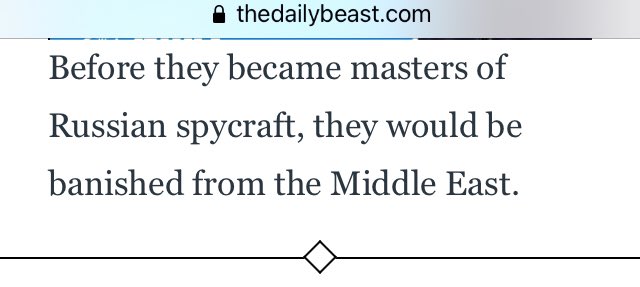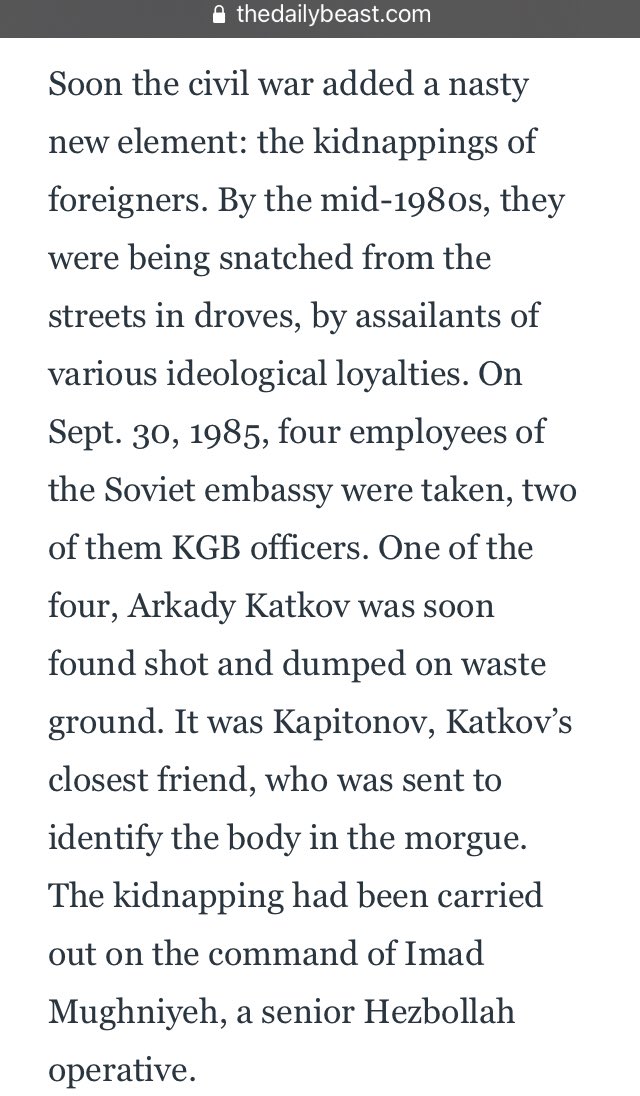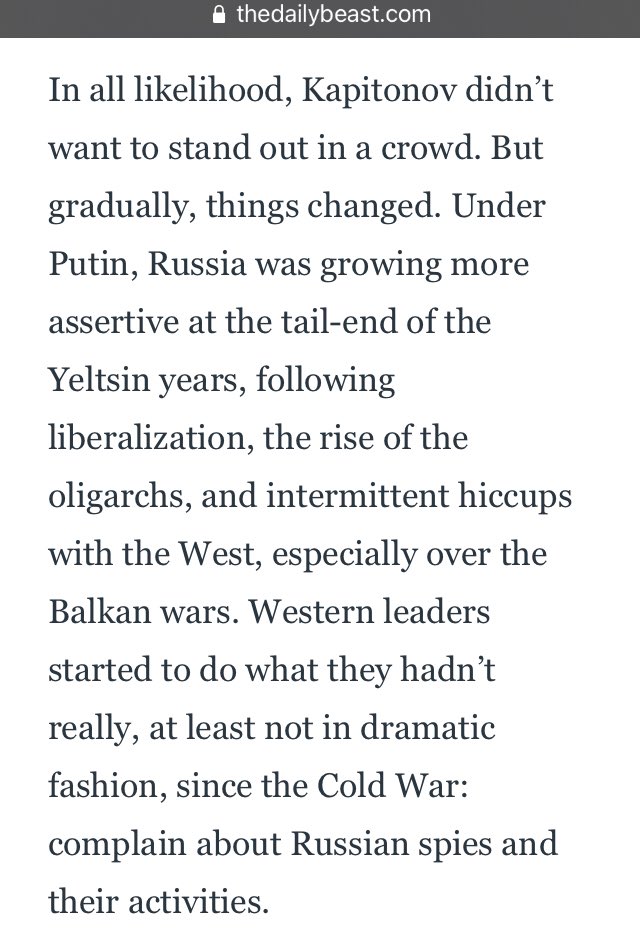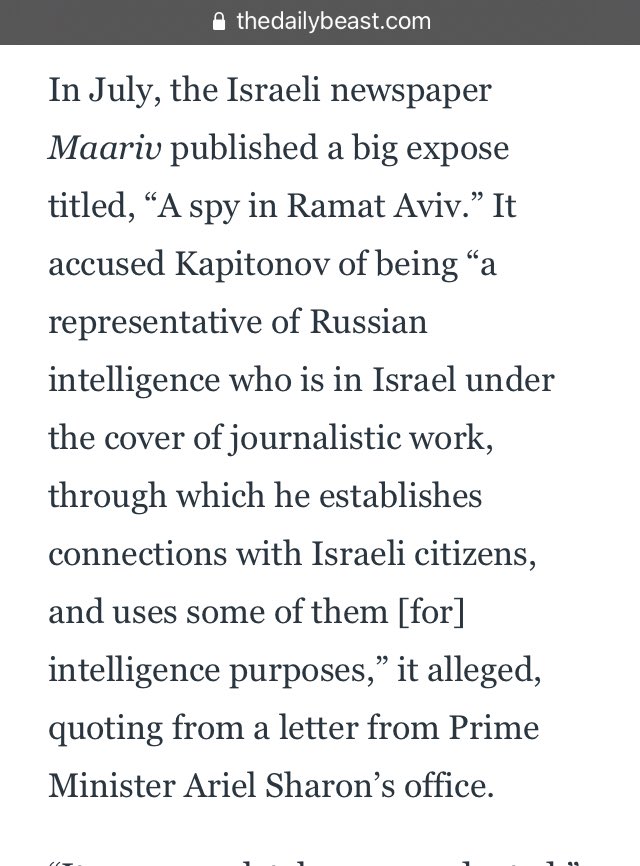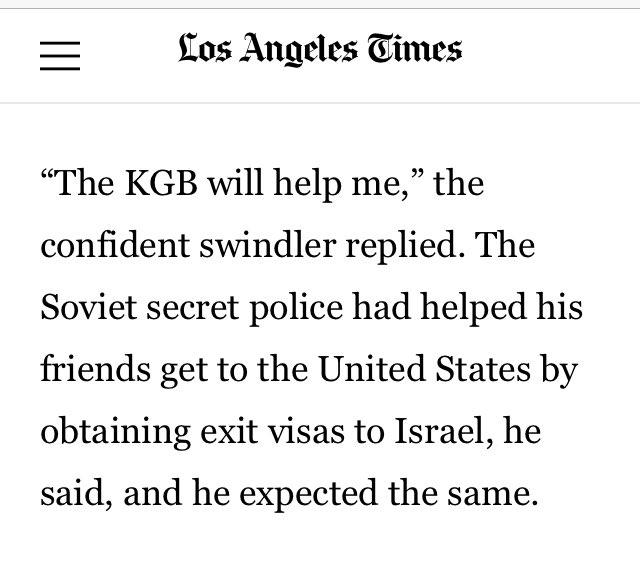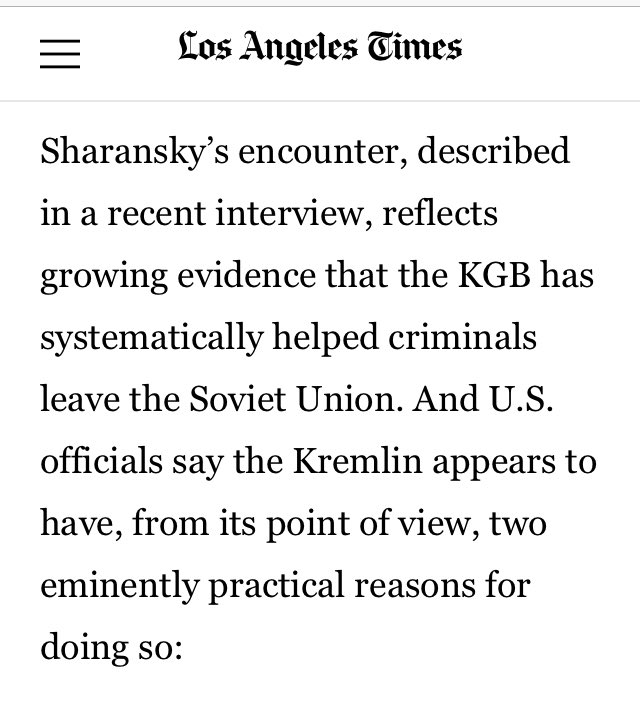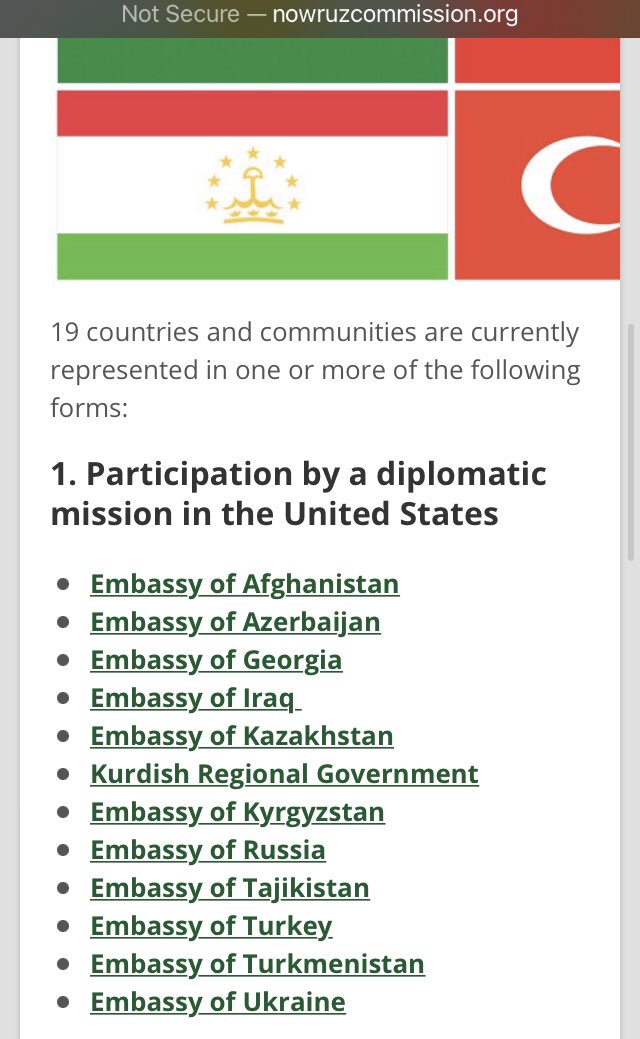
A cabal of KGB operatives stationed in Arab countries and Israel took over Russian foreign intelligence at the end of the Cold War. Their impact is still felt.
thedailybeast.com/how-a-renegade…
thedailybeast.com/how-a-renegade…
Kapitonov was part of a group known in Russian intelligence as “the Middle Eastern mafia,” a cabal of Arabist or Perisianist KGB officers who in the late 1980s took over the KGB foreign intelligence service and, after the collapse of the Soviet Union, reinvented it in their image 
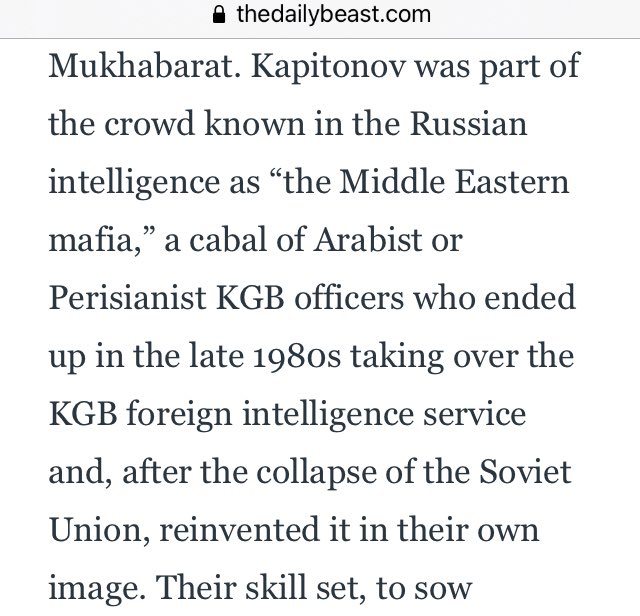
Their skill set, to sow disinformation and propaganda in a part of the world where conspiracy theories and lies are rife to begin with, has now become highly relevant again, affecting the psychological underpinnings of democracies and dictatorships alike. 
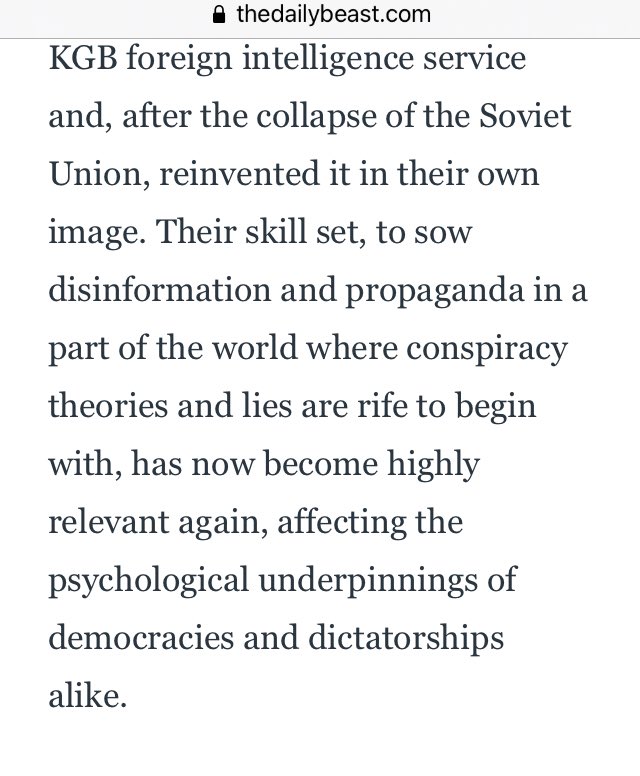
It was the late 2000s. Kapitonov’s wings had been clipped and he’d been “grounded” in Russia for several years. He couldn’t get another posting as a correspondent in the Middle East, but thanks to the internet, he kept busy. 
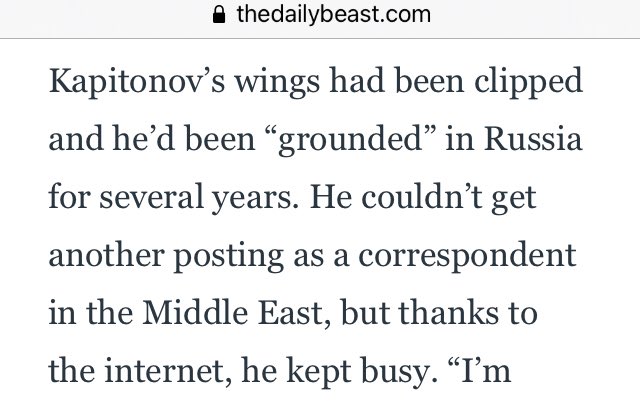
I’m doing a lot of writing of black stories on Timoshenko,” he said, referring to Yulia, one of the architects of Ukraine’s 2004 Orange Revolution. These stories,” he said, were all being published “on some shitty Ukrainian websites—under a pseudonym, of course.” 

A book with Primakov’s name on it was proof Kapitonov still had contacts at the highest levels of foreign intelligence. 
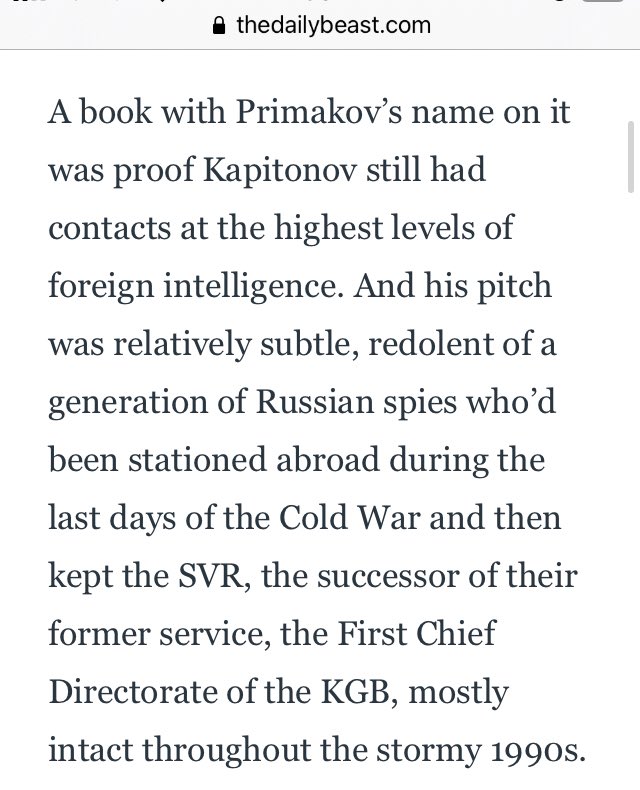
…his pitch was relatively subtle, redolent of a generation of Russian spies who’d been stationed abroad during the last days of the Cold War and then kept the SVR, the successor of their former service, the First Chief Directorate of the KGB, mostly intact throughout the 1990s. 
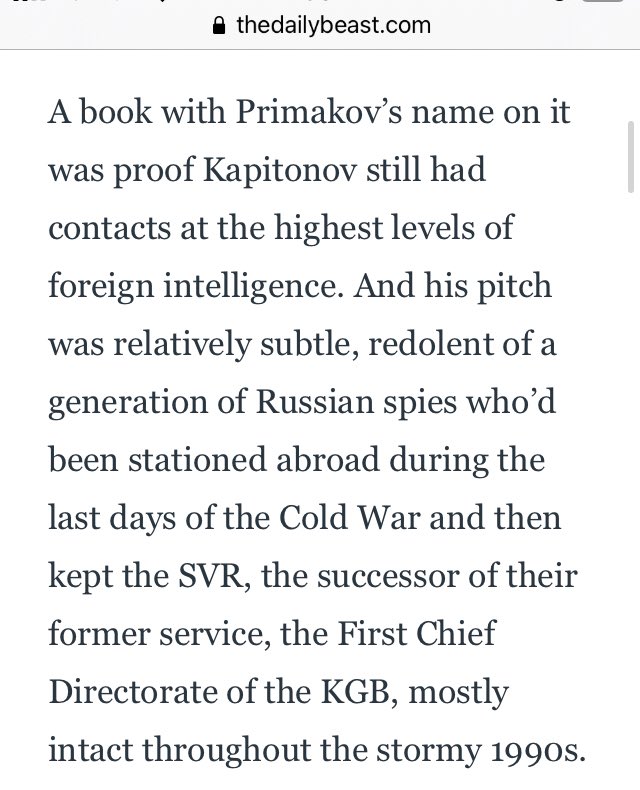
On Sept. 16, 1981, Egyptian president Anwar el-Sadat announced the expulsion of the Soviet ambassador along with six members of his staff, and two Soviet journalists. One of them was Konstantin Kapitonov, then a 35-year-old correspondent for the Soviet newspaper Trud (“Labor”). 
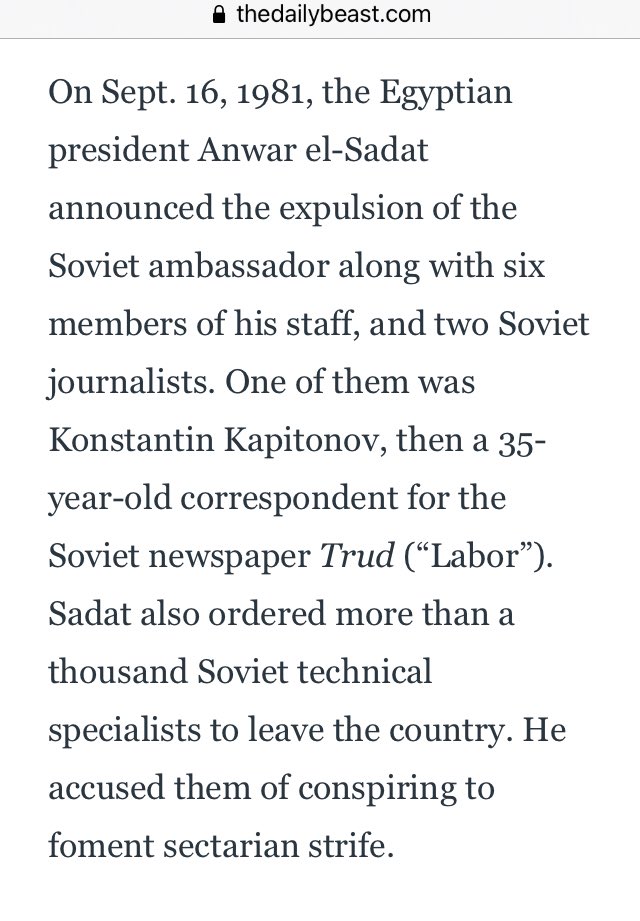
Sadat also ordered more than a thousand Soviet technical specialists to leave the country. He accused them of conspiring to foment sectarian strife. 
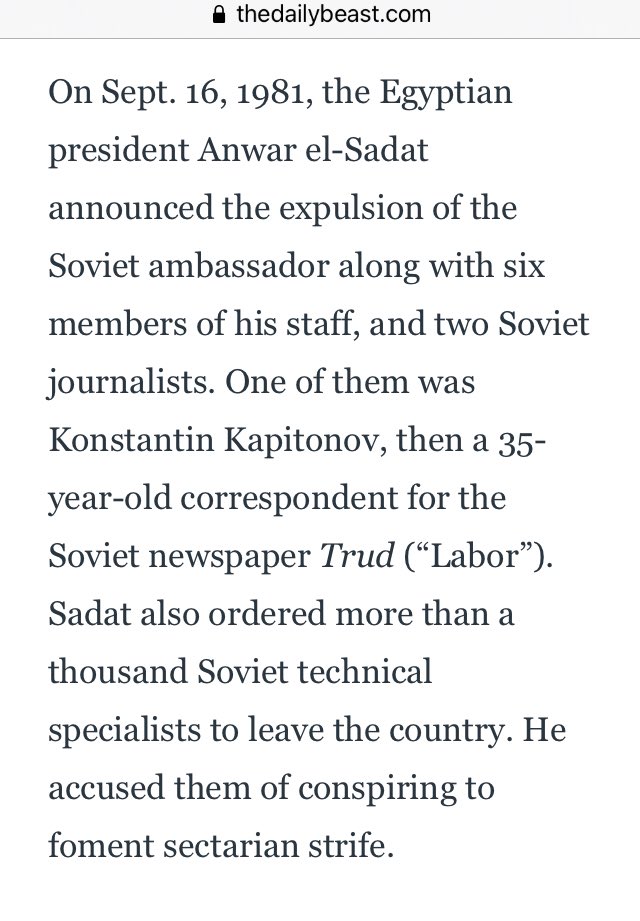
The crackdown on the Soviet presence followed a failed military coup in June. Sadat clearly believed that the Soviets were plotting against him by promoting a rift between Christians and Muslims in Egypt. 
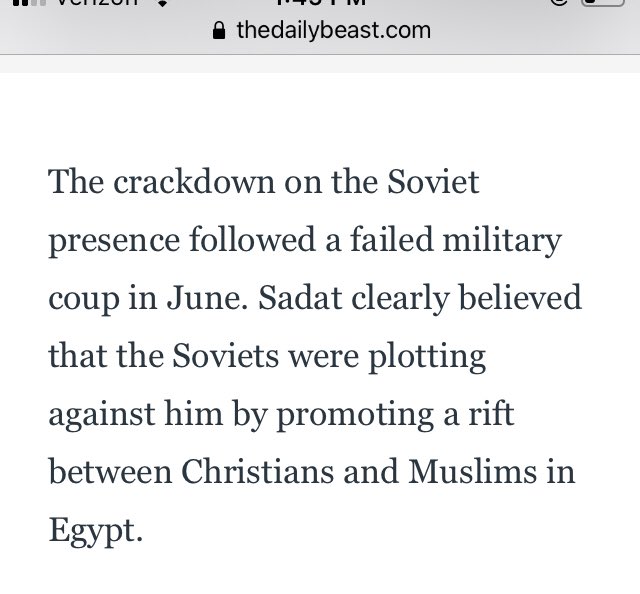
For the Soviet embassy, it was an unpleasant but unsurprising development. Moscow had 41 diplomats & other staff stationed in Egypt. Over 30 of them were spies, working around the clock. It was not enough, as every year, Sadat was getting more & more hostile towards the Soviets. 
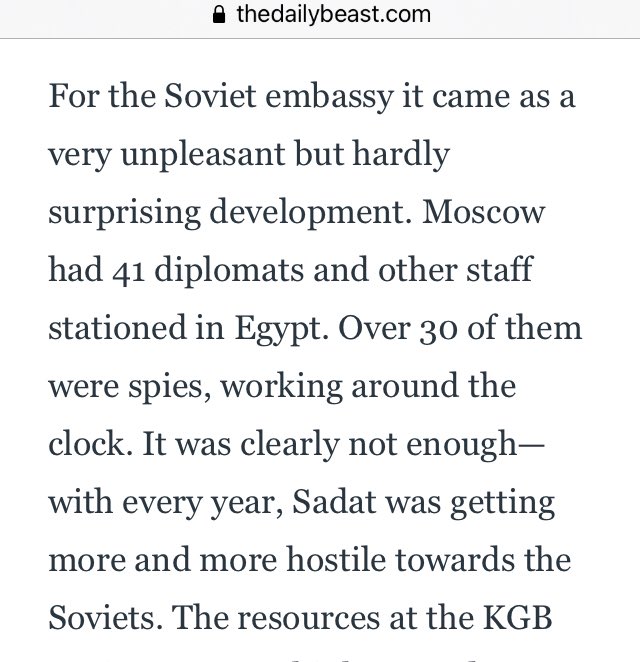
The resources at the KGB station were so thinly spread between Cairo and Alexandria that in 1977 Moscow Center directed the station in Cairo to start recruiting Soviet Arabists “to collect political intelligence and conduct active measures.” 
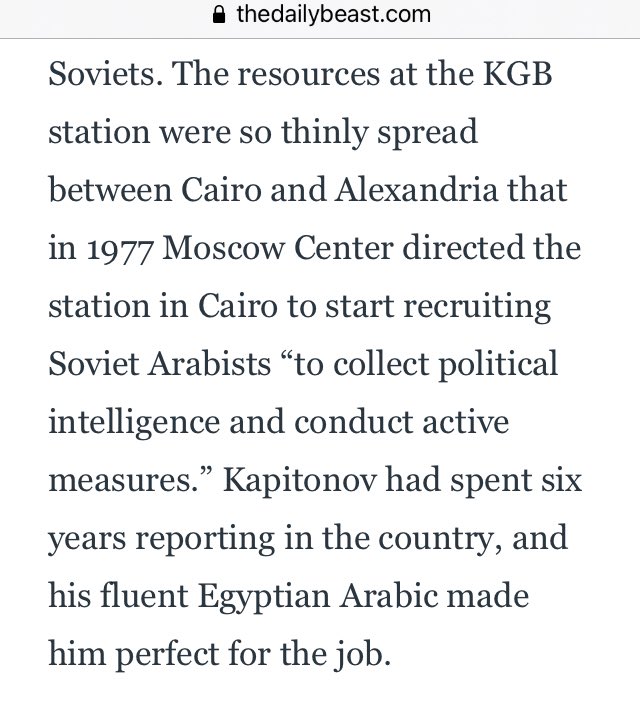
Kapitonov had spent six years reporting in the country, and his fluent Egyptian Arabic made him perfect for the job.
But Sadat’s orders meant everything came to an abrupt end.
But Sadat’s orders meant everything came to an abrupt end.
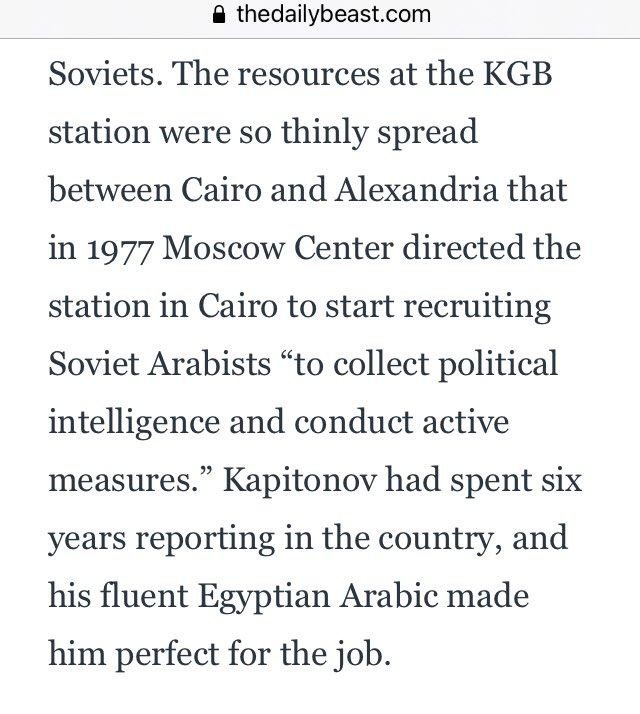
Kapitonov flew back to Moscow.
In the Soviet bureaucracy, expulsion from the West was never considered an auspicious start of one’s career, either for a journalist or a spy. But the Middle East was a different story, particularly if you’d played your cards right, & Kapitonov had.
In the Soviet bureaucracy, expulsion from the West was never considered an auspicious start of one’s career, either for a journalist or a spy. But the Middle East was a different story, particularly if you’d played your cards right, & Kapitonov had.
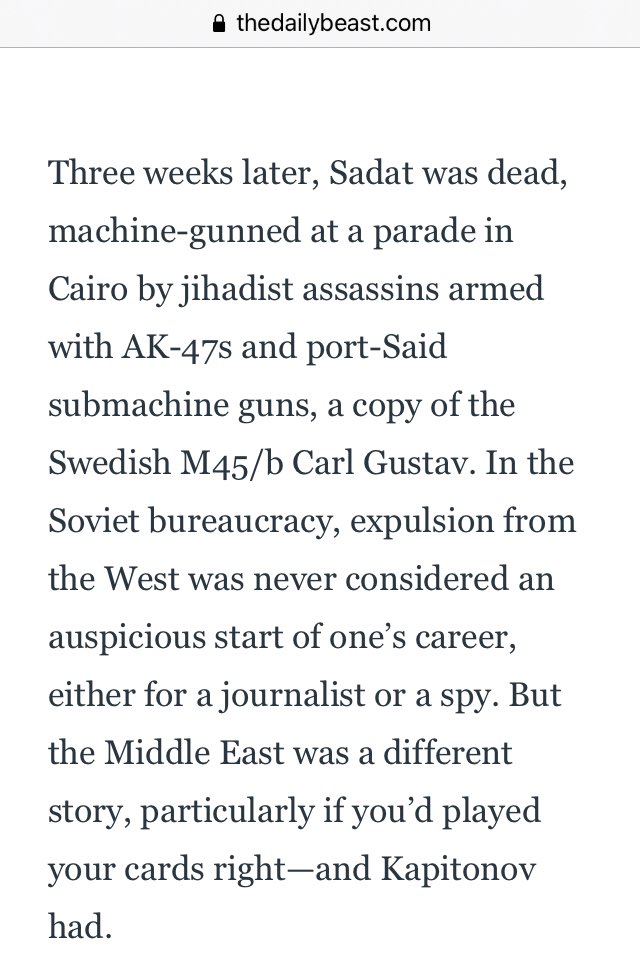
Partly because there were several powerful people kicked out of Egypt along with him…
Colonel Yuri Kotov, chief of the KGB station in Cairo, a balding, stocky man with distinctive eyebrows, also left the country. Kotov was a rising star in the First Chief Directorate, the foreign intelligence arm of the service. 
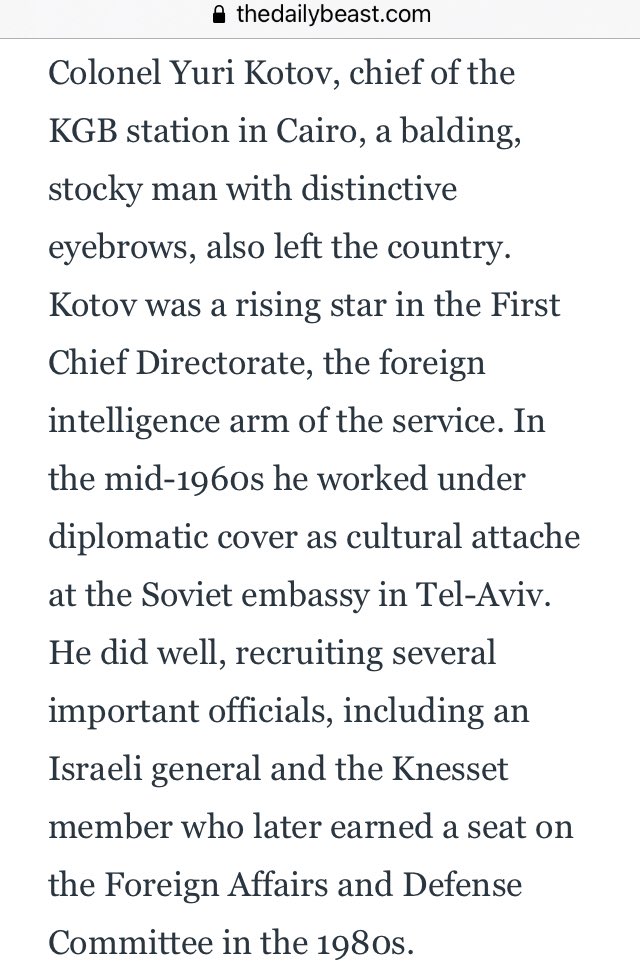
In the mid-60s he worked under diplomatic cover as cultural attache at the Soviet embassy in Tel-Aviv. He did well, recruiting several important officials, including an Israeli general & Knesset member who later earned a seat on the Foreign Affairs & Defense Committee in the 80s. 
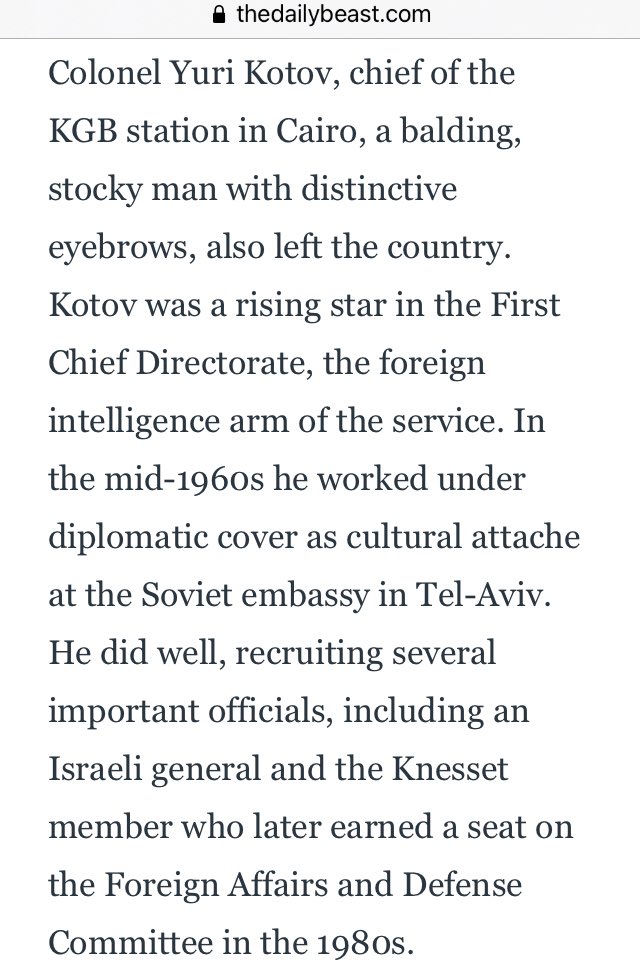
Kotov was also a shrewd political operator. After the Soviet Union closed its embassy in Israel due to a break in bilateral relations owing to the Six-Day War, Kotov was transferred to Beirut. There he became close to Evgeny Primakov, who was foreign correspondent for Pravda. 

Primakov was assigned as secret Soviet envoy to Israel & he made Kotov his traveling companion, a mission which didn’t bear much fruit but advanced Kotov’s career. He was promoted to colonel with the endorsement of KGB chairman Yury Andropov, then assigned station chief, in Cairo 
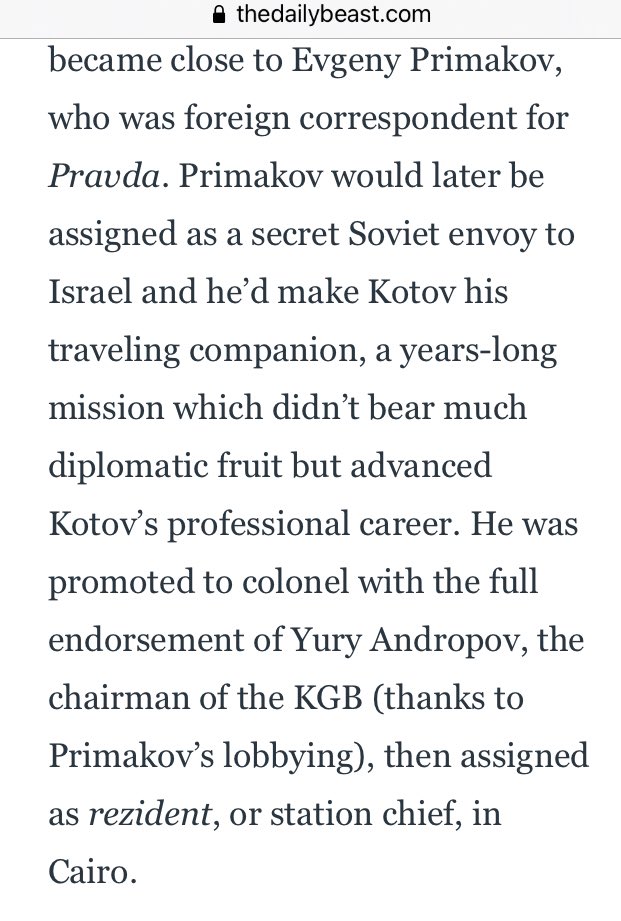
Thus Sadat’s mass expulsion of Soviet spies & agents didn’t affect Krotov’s stature, or Kapitonov’s. In fact, it strengthened the relationships of a tight-knit network of KGB Arabists who, years on, would be nicknamed “the Middle Eastern mafia” of Russian Foreign Intelligence. 
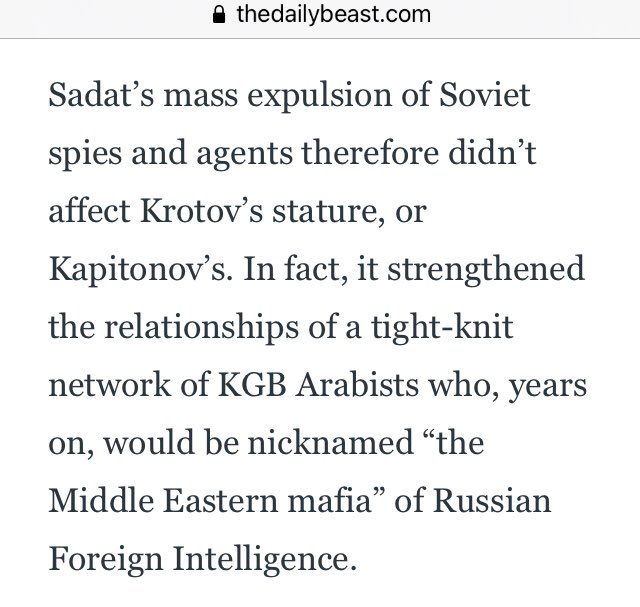
In June of 1982, just nine months after Kapitonov’s expulsion from Egypt, he found himself again in the Middle East—this time in Beirut. 
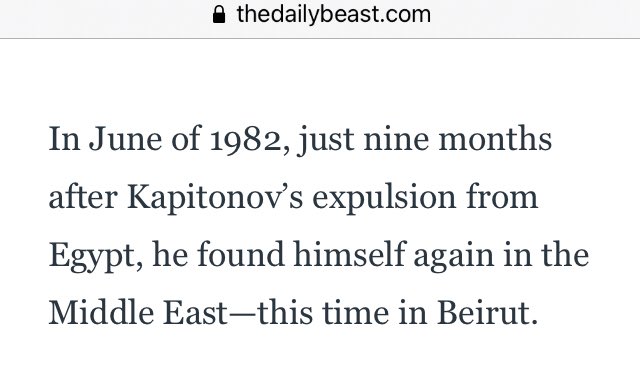
The KGB had a special interest in Lebanon: not because of the country in itself but because it was considered a good spot for targeting and recruiting Americans. 
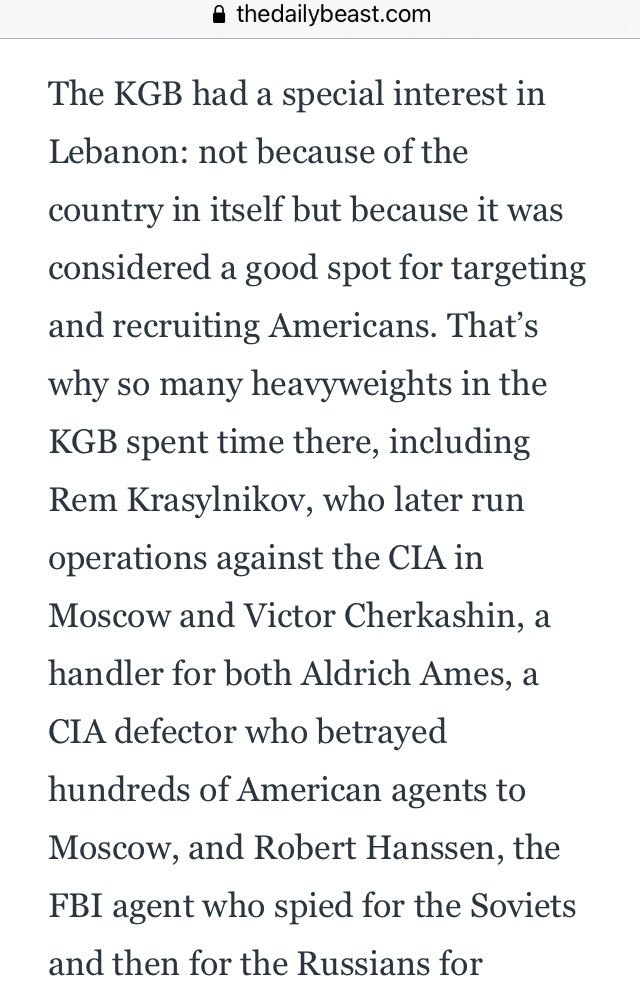
That’s why so many heavyweights in the KGB spent time there, including Rem Krasylnikov, who later run operations against the CIA in Moscow… 
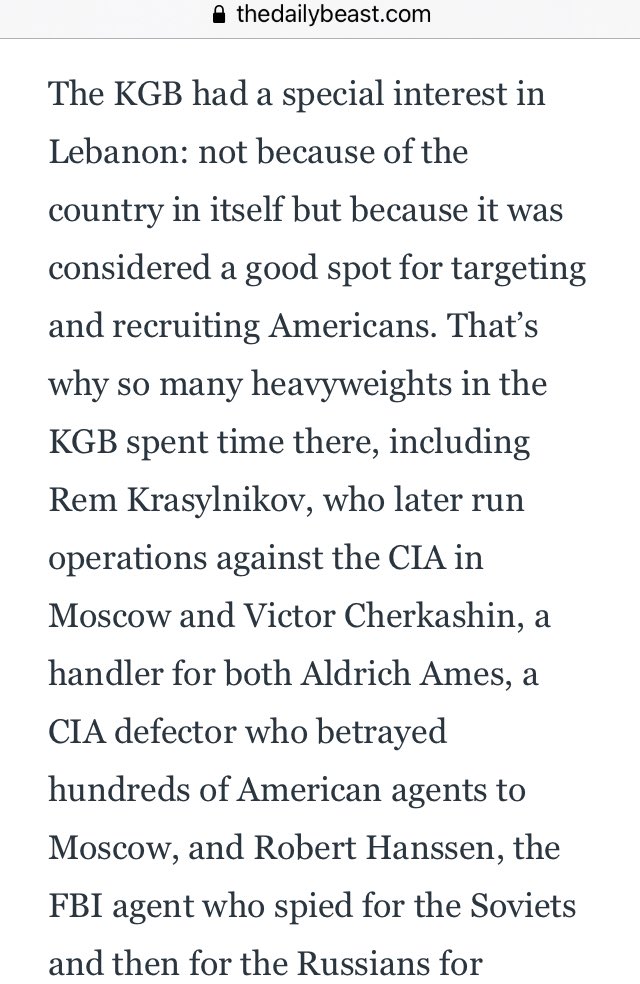
…and Victor Cherkashin, a handler for both Aldrich Ames, a CIA defector who betrayed hundreds of American agents to Moscow, and Robert Hanssen, the FBI agent who spied for the Soviets and then for the Russians for decades. Another bigwig in Beirut was Kotov. 
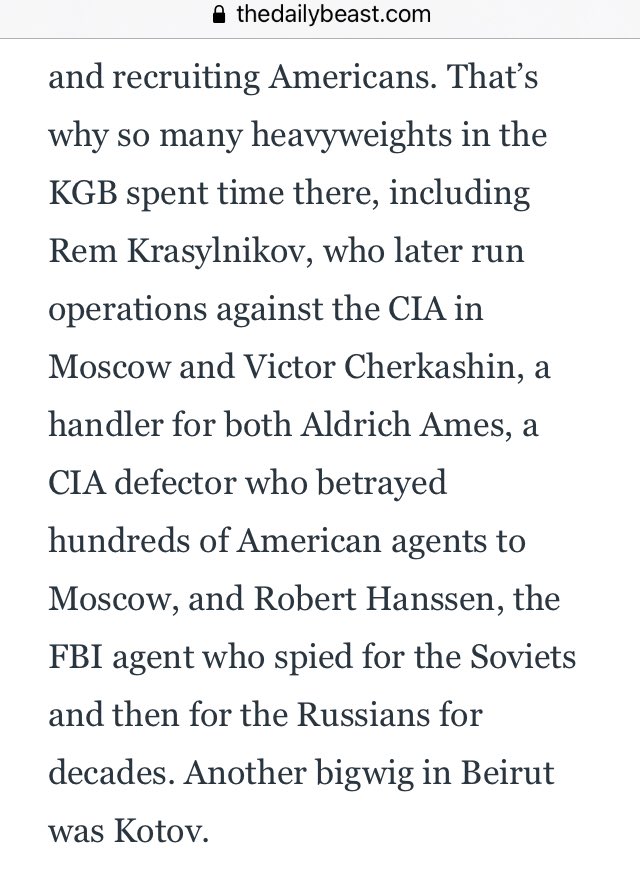
🚨🚨🚨🚨
Did you see that part?? ⬆️⬆️
I never realized before that the same agent handled both Ames and Hanssen. 🤯🤯
Did you see that part?? ⬆️⬆️
I never realized before that the same agent handled both Ames and Hanssen. 🤯🤯
In 1982, Kapitonov was dispatched to Beirut as a correspondent of Literaturnaya Gazeta weekly, an ostensible literary review which was actually the KGB’s “prime conduit in the Soviet press for propaganda and disinformation,” according to former KGB General Oleg Kalugin. 
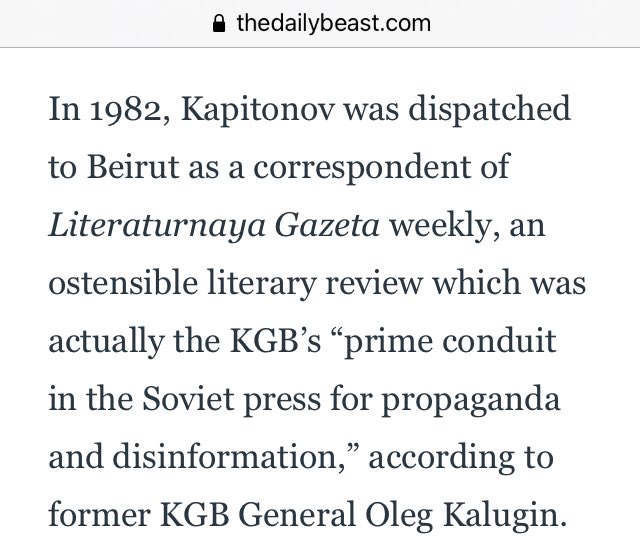
The year Kapitonov left Moscow for Beirut, Literaturnaya Gazeta published a long story titled, “Incubator of Death,” about a CIA factory for weaponized mosquitoes. The story was a response to the American accusations that the Soviet army had used chemical weapons in Afghanistan. 
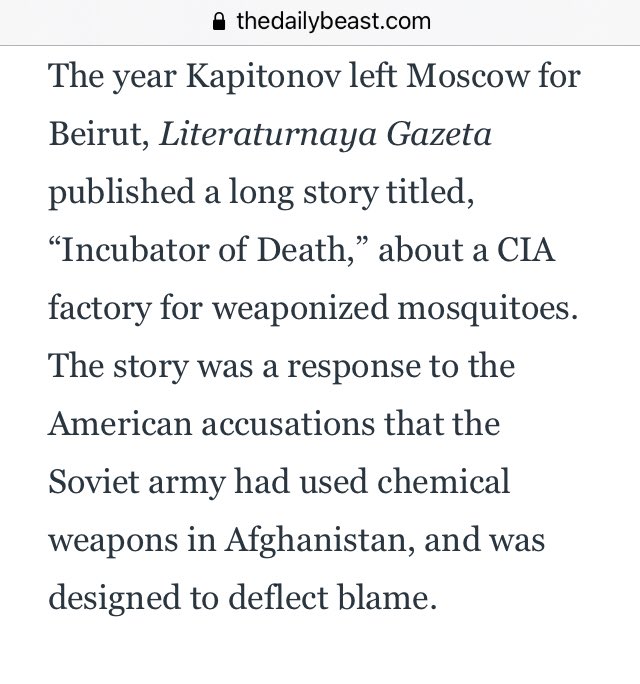
The network of Literaturnaya Gazeta’s foreign bureaus around the world was essentially a joint enterprise sponsored by the KGB. The weekly got bureaus, and KGB spies were given journalistic cover. 
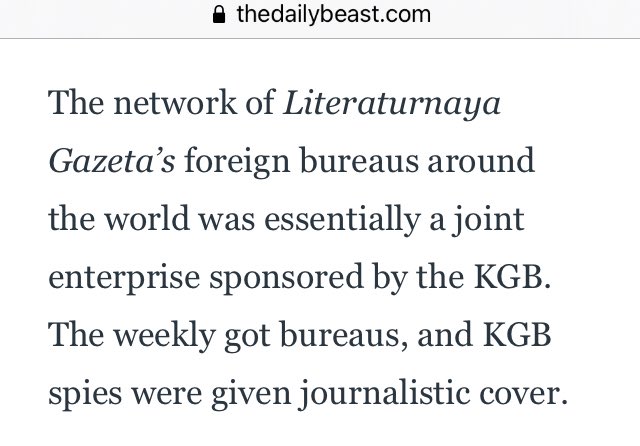
Kapitonov arrived at a turbulent time. Lebanon was going through a horrible civil war. Numerous militant factions were busy killing one another on the streets of Beirut and the Israeli army had invaded from the south. 
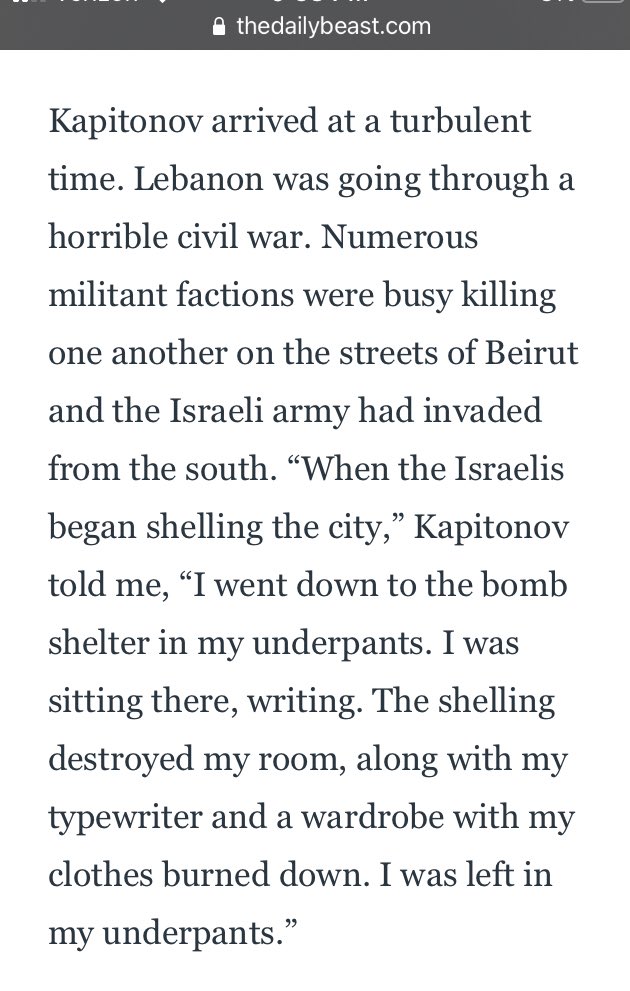
Soon the civil war added a nasty new element: the kidnappings of foreigners. By the mid-1980s, they were being snatched from the streets in droves, by assailants of various ideological loyalties. 
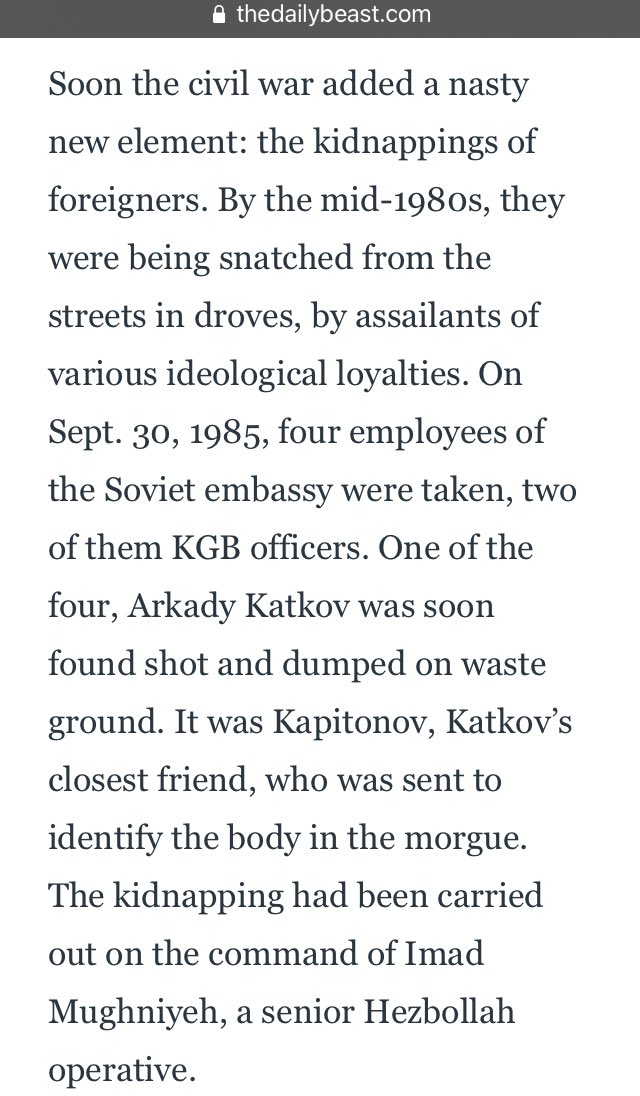
On Sept. 30, 1985, four employees of the Soviet embassy were taken, two of them KGB officers. One of the four, Arkady Katkov was soon found shot and dumped on waste ground. It was Kapitonov, Katkov’s closest friend, who was sent to identify the body in the morgue. 
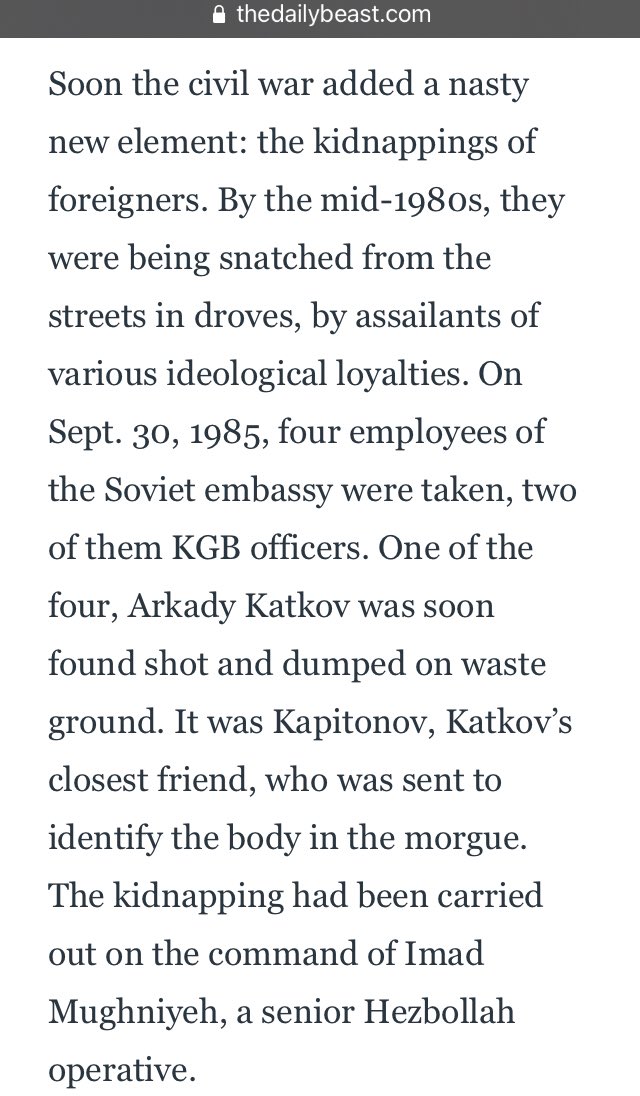
The KGB launched a massive hostage rescue operation, and some of the employees were evacuated to Damascus for security reasons, including Kapitonov. At that point, there were very few foreign journalists, real or otherwise, remaining in Beirut. 
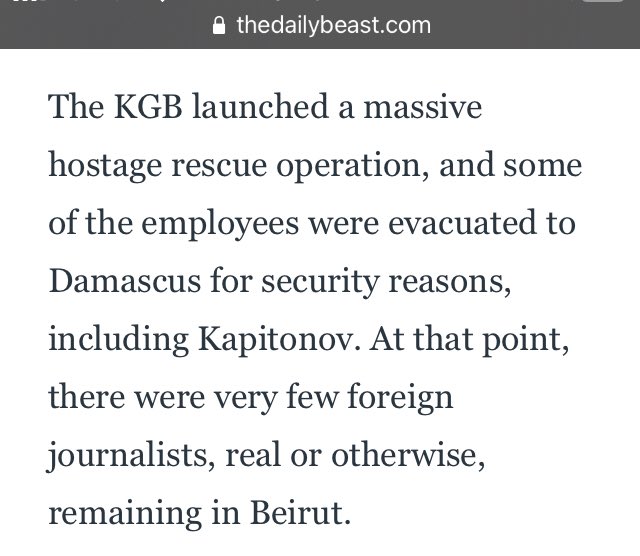
the three Russian hostages were eventually released, unharmed, and rumors swirled that the KGB had applied brutal methods to retrieve them—a relative of an attacker was said to be tortured and killed. 
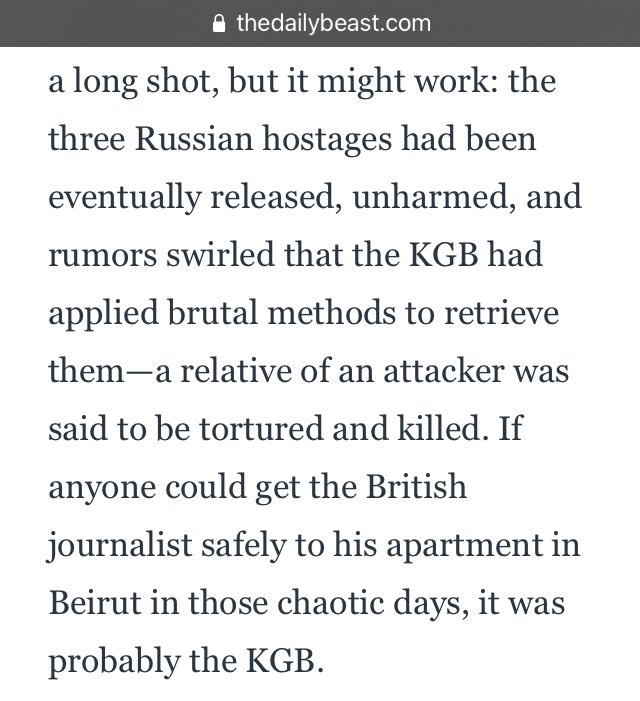
Under ordinary circumstances, such a breach of protocol [Kapitonov helping Fisk] would result in immediate recall to Moscow, or worse—but Kapitonov wasn’t an ordinary spy. 
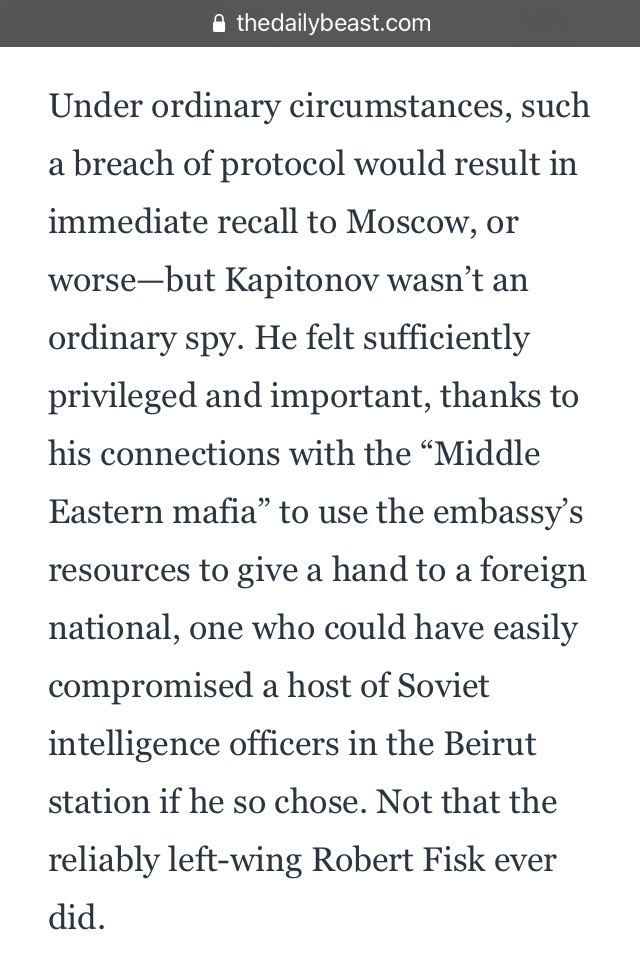
He felt sufficiently privileged & important, thanks to his connections with the “Middle Eastern mafia”, to use the embassy’s resources to give a hand to a foreign national, one who could have easily compromised a host of Soviet intelligence officers in the Beirut station… 
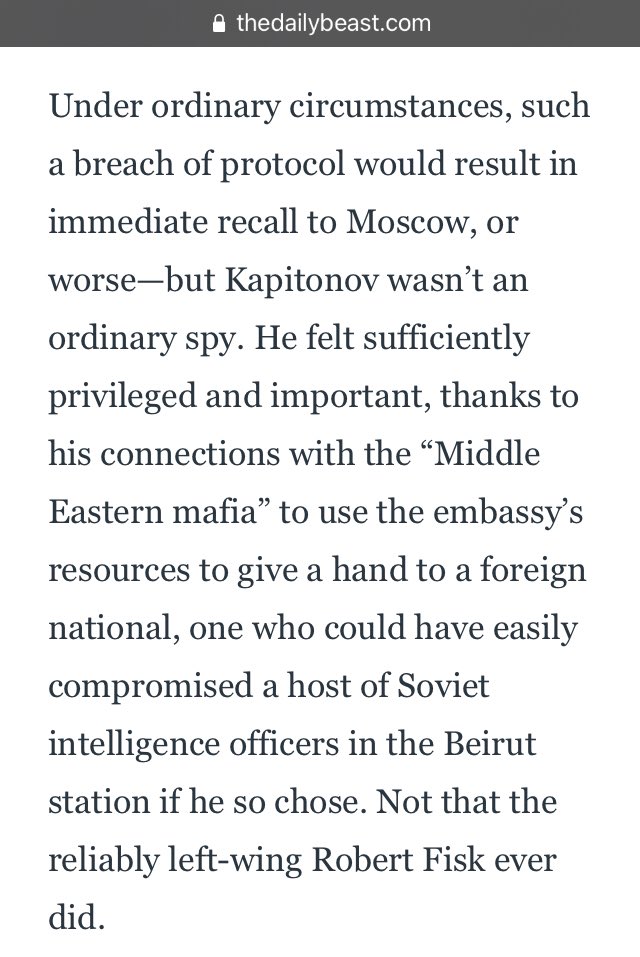
By 1988, Kapitonov was back in Moscow, amid Gorbachev and glasnost. His editor at Literaturnaya Gazeta, the hardliner Chakovsky, was on his way out. But the Middle Eastern mafia was on the rise, both in politics and in the intelligence establishment. 
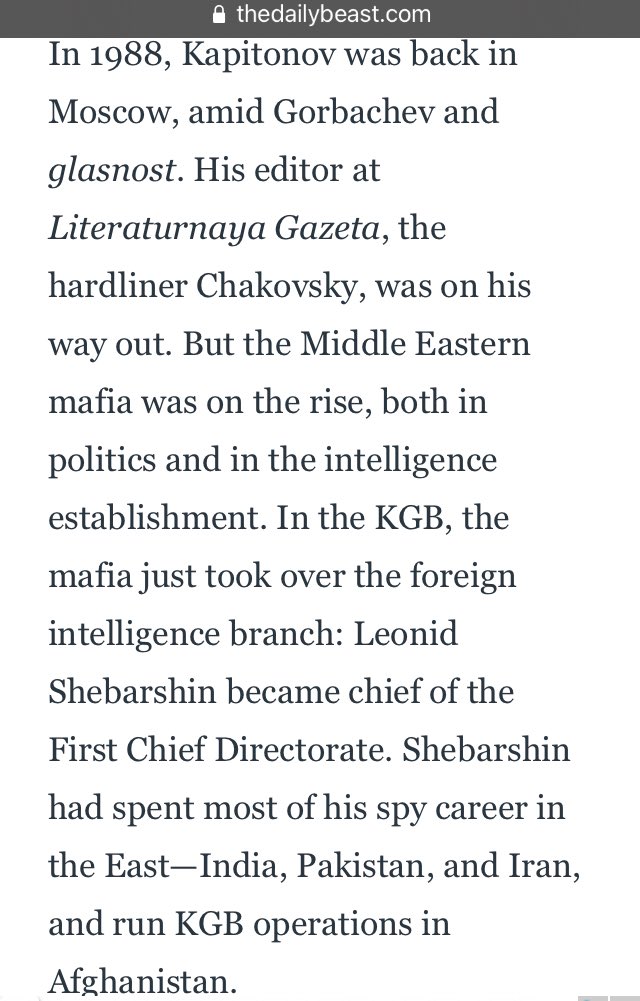
In the KGB, the Middle East mafia just took over the foreign intelligence branch: Leonid Shebarshin became chief of the First Chief Directorate. Shebarshin had spent most of his spy career in the East—India, Pakistan, and Iran, and run KGB operations in Afghanistan. 
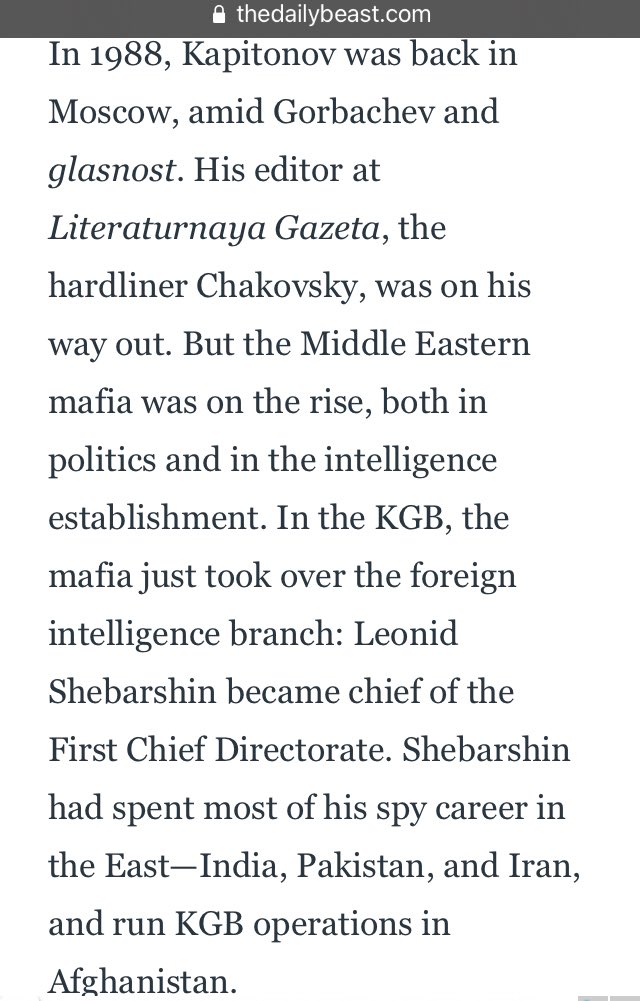
Kotov was in Turkey, running the station in Ankara. Primakov, now director of IMEMO, the country’s top foreign policy think tank, was just elected to the Soviet Supreme Council. He continued to rise in the government and in the Communist Party. 
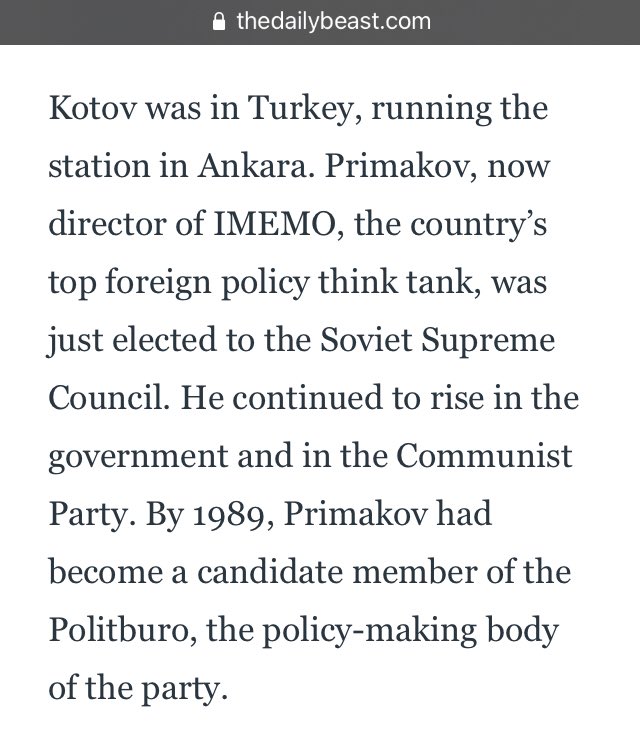
And by 1989, Primakov had become a candidate member of the Politburo, the policy-making body of the party. 
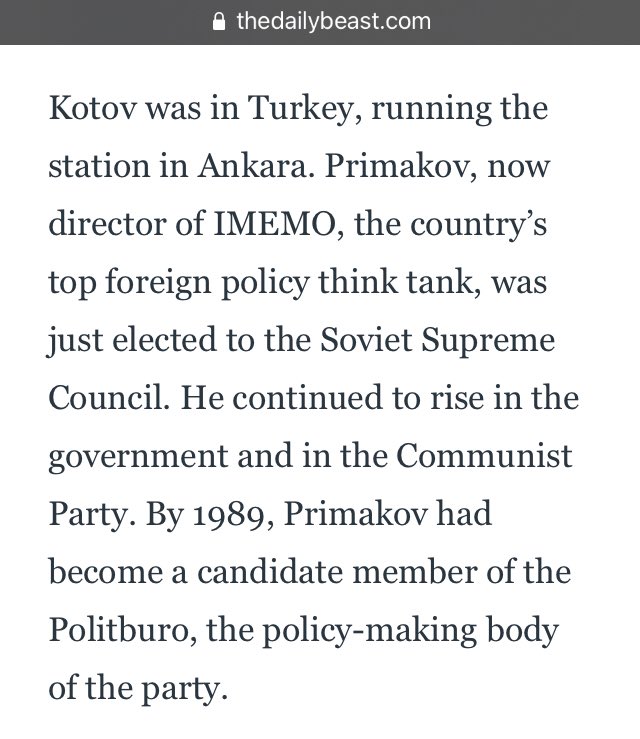
But then everything started falling apart. The Eastern bloc collapsed; in Jan 1990, angry citizens stormed the Stasi headquarters in Berlin, and Stasi leaders were jailed. The same year, one of the saved Russian hostages in Beirut, a KGB major Oleg Spirin, defected to the U.S. 
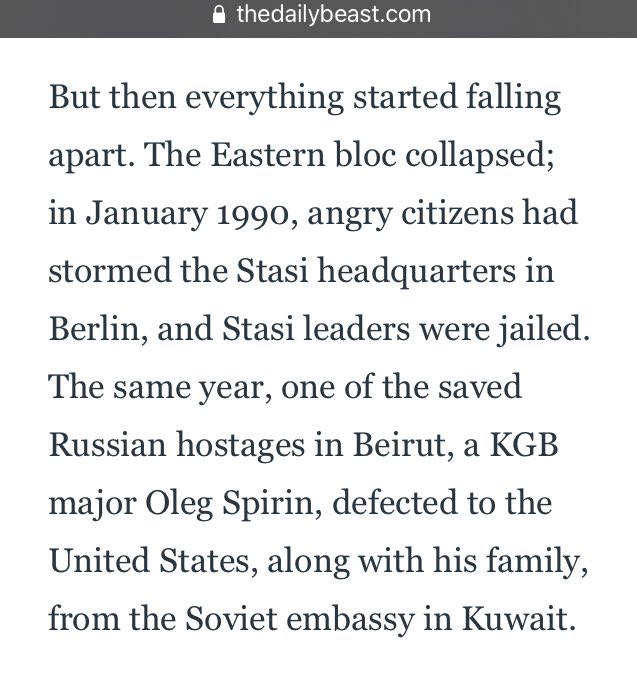
Shebarshin hastily developed a contingency plan to save the First Chief Directorate by making it independent from the rest of the KGB and whitewashing its reputation as the most liberal, worldly part of the KGB. 
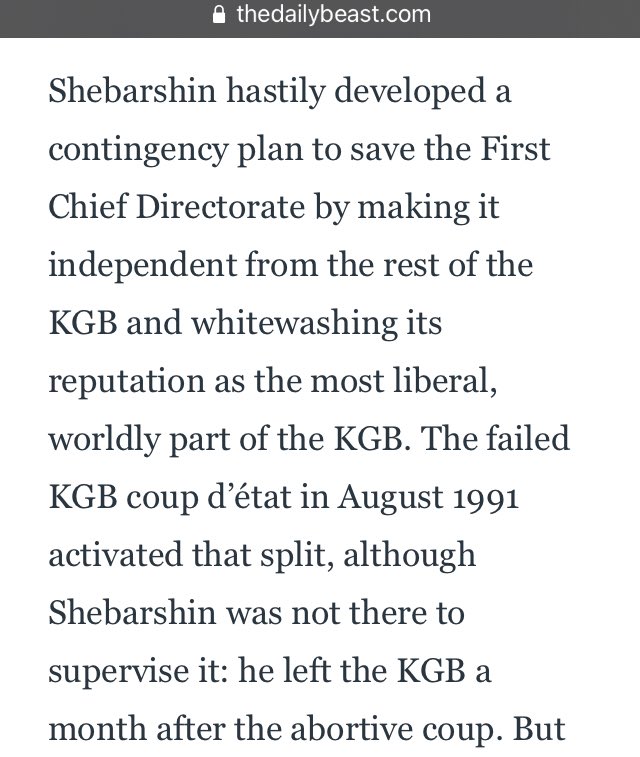
The failed KGB coup d’état in August 1991 activated that split, although Shebarshin was not there to supervise it: he left the KGB a month after the abortive coup. 
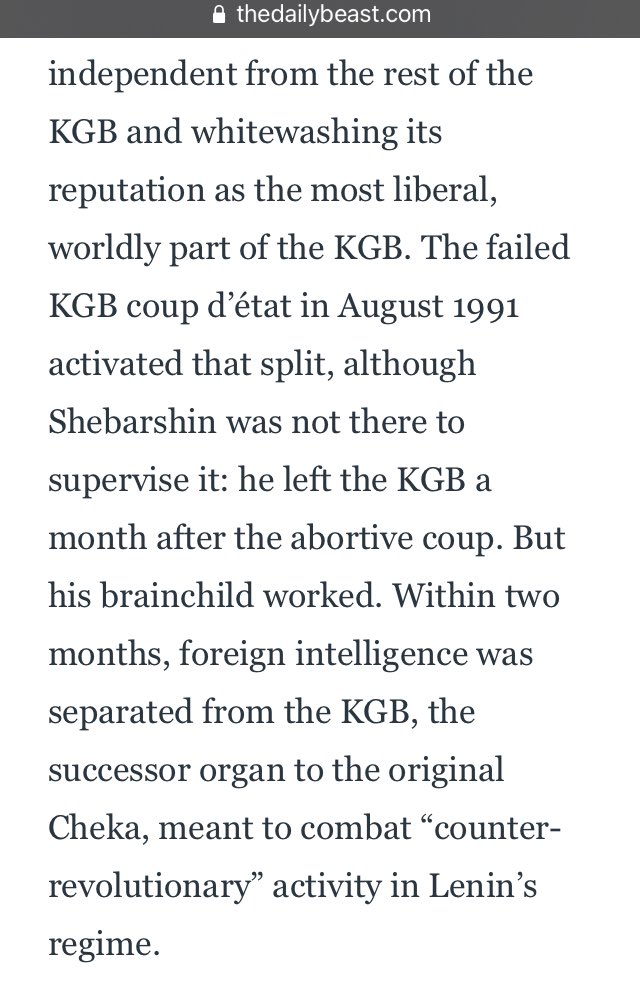
But his brainchild worked. Within two months, foreign intelligence was separated from the KGB, the successor organ to the original Cheka, meant to combat “counter-revolutionary” activity in Lenin’s regime. 
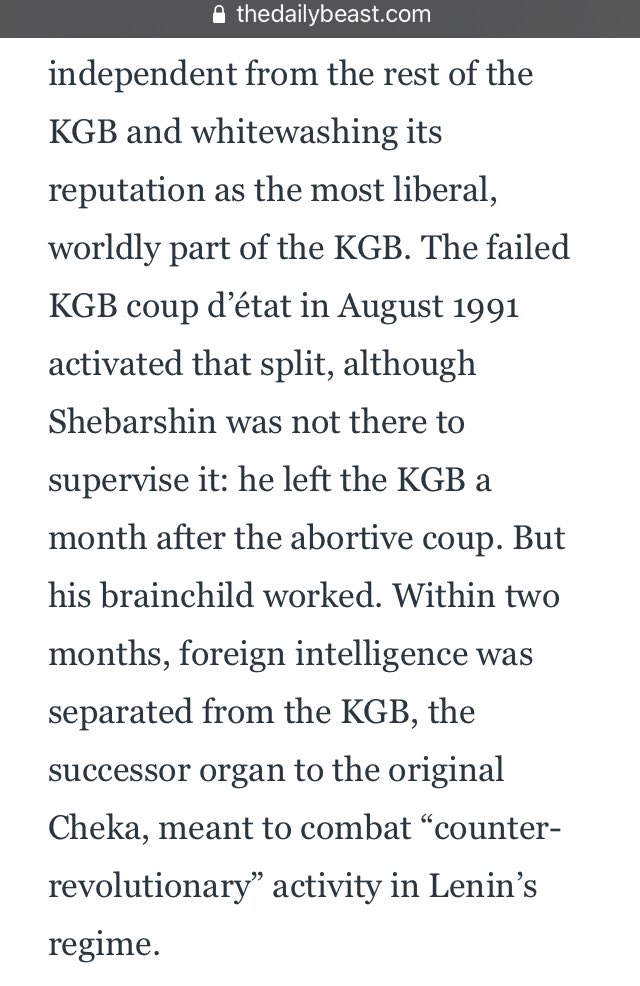
In December 1991, the Soviet Union itself ceased to exist and foreign intelligence got a new name—Sluzhba Vneshney Razvedki, or SVR—and a new chief, Evgeny Primakov. 

Ever loyal to the Middle Eastern mafia…Primakov turned to Kotov, who had been officially sacked by a new democratic leadership of the KGB.
Primakov made Kotov his personal adviser on intelligence—and with that, the only chance to reform Russia’s foreign intelligence was missed
Primakov made Kotov his personal adviser on intelligence—and with that, the only chance to reform Russia’s foreign intelligence was missed
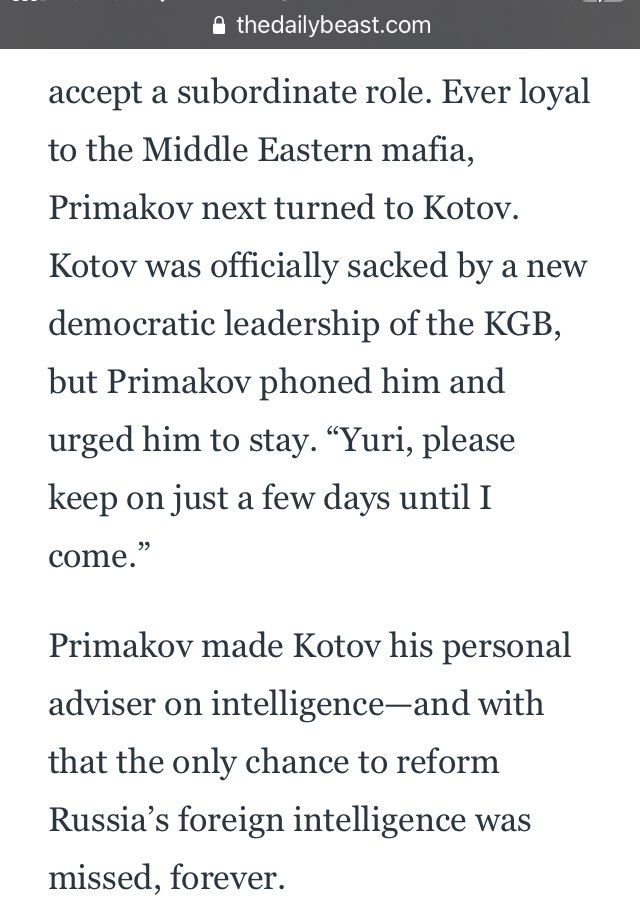
The 1990s were a difficult time for Kapitonov. The SVR was impoverished and had few resources or personnel to keep going as it had done in the 1980s. 
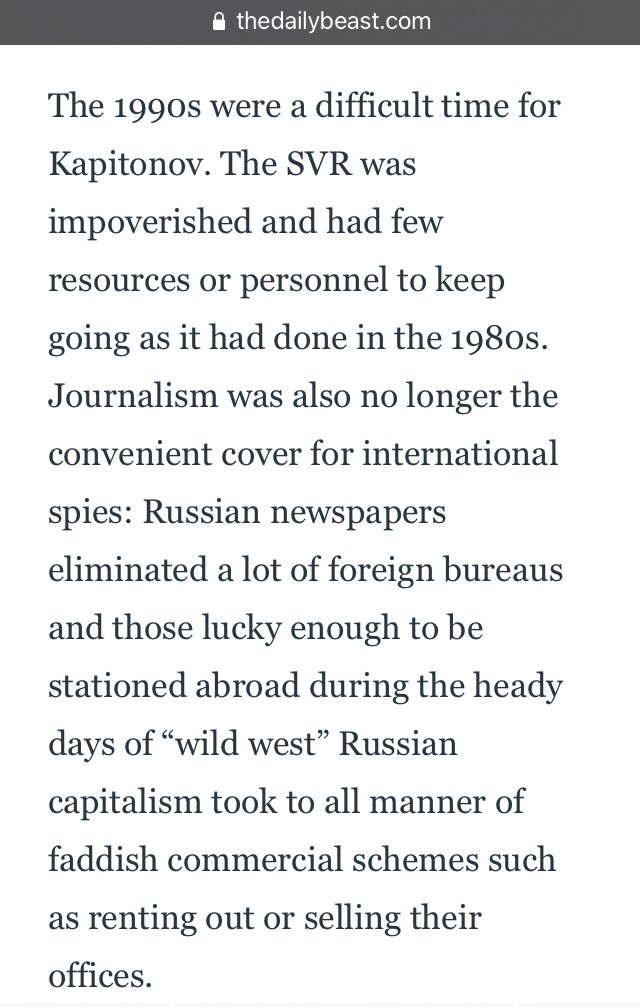
Journalism was also no longer the convenient cover for international spies: Russian newspapers eliminated a lot of foreign bureaus, and those lucky enough to be stationed abroad resorted to all manner of faddish commercial schemes such as renting out or selling their offices. 
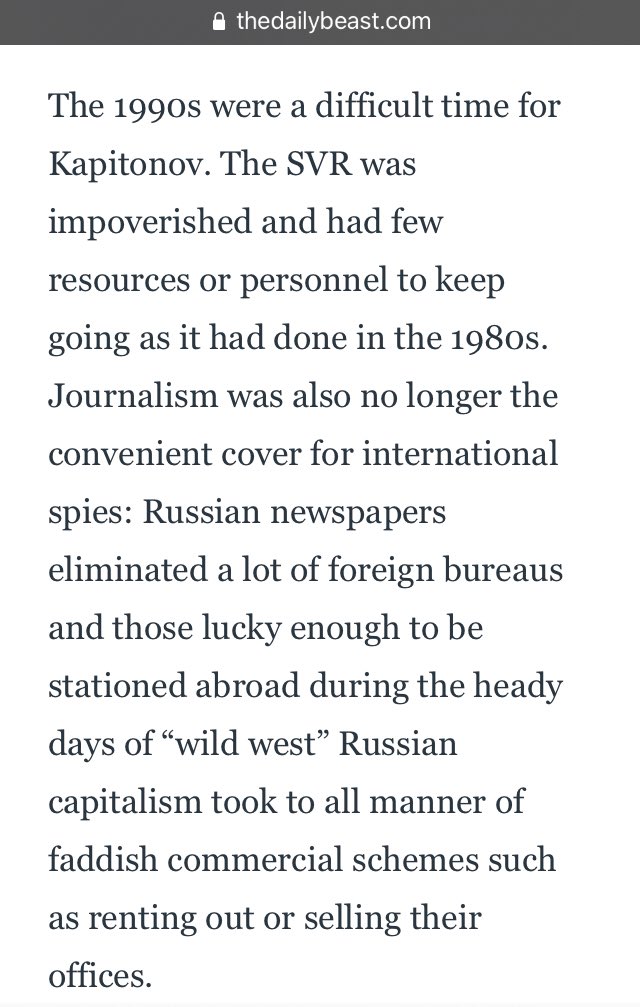
Meanwhile Kapitonov was in Moscow and stuck or “grounded,” as he put it, rather like Russian intelligence itself. But… 
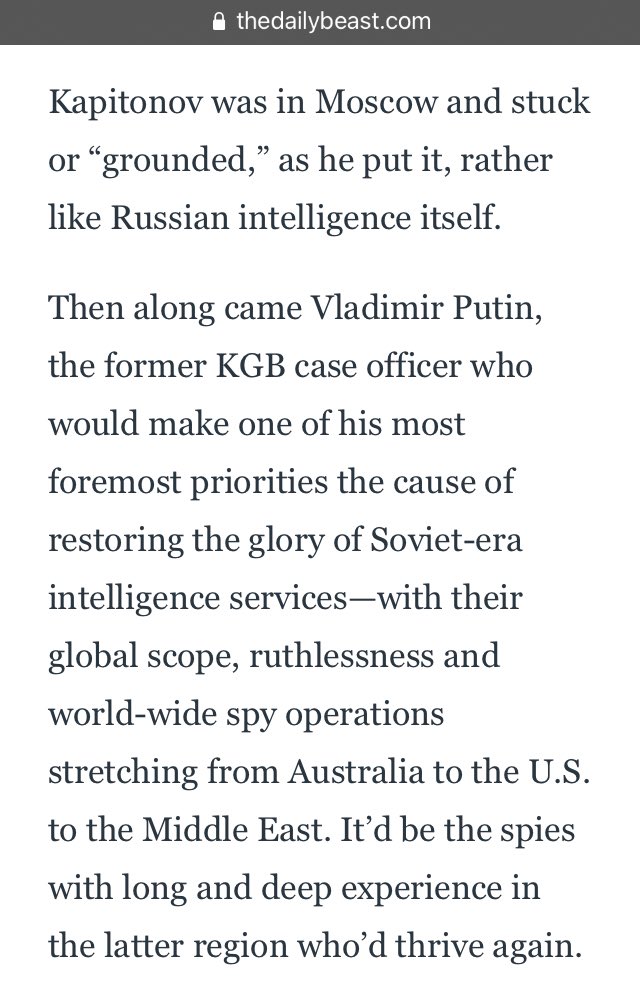
Then along came Vladimir Putin, a former KGB case officer who would make one of his foremost priorities to restore the glory of Soviet-era intelligence services, with their global scope, ruthlessness, & worldwide operations stretching from Australia to the U.S. to the Middle East 
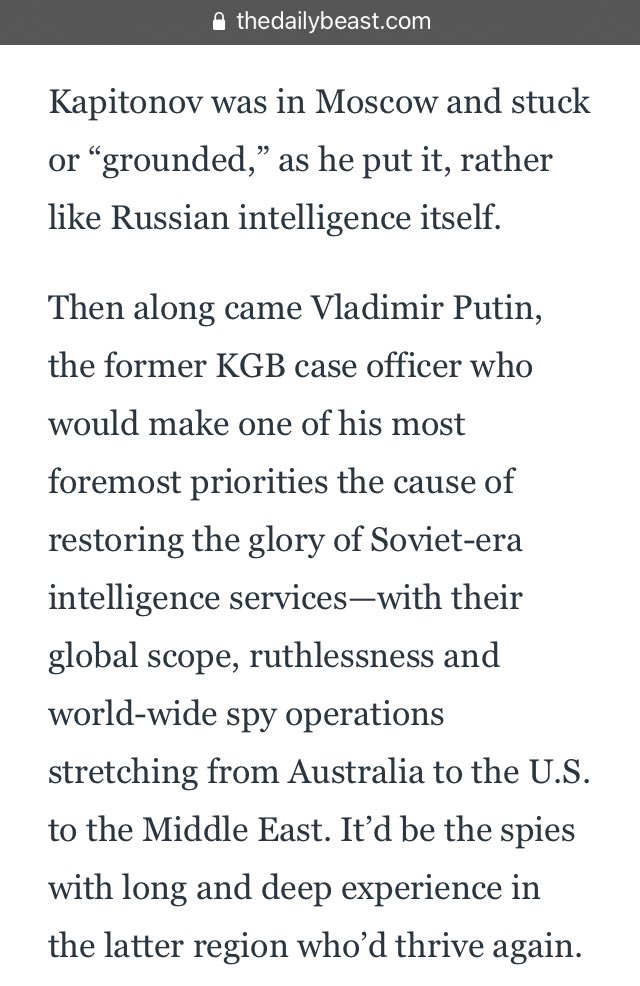
It would be the spies with long and deep experience in the latter region (the Middle East) who would thrive again. 
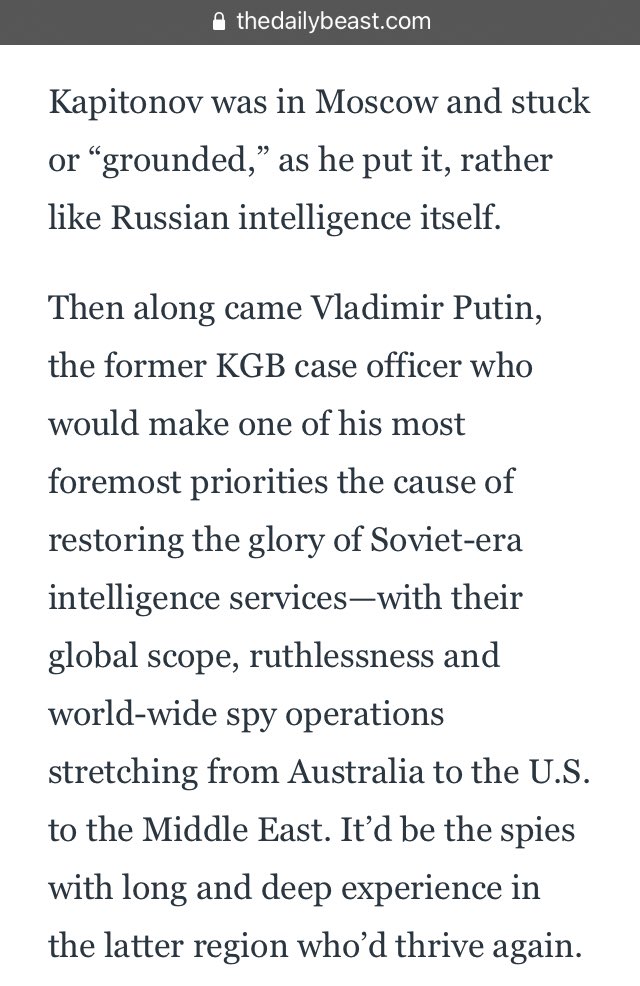
It was 1999. In Moscow, Putin, a FSB director, was made Russia’s prime minister, and was already being talked about as Yeltsin’s successor as president. The security and intelligence agencies sensed they were back in the saddle again, after a decade of interregnum. 
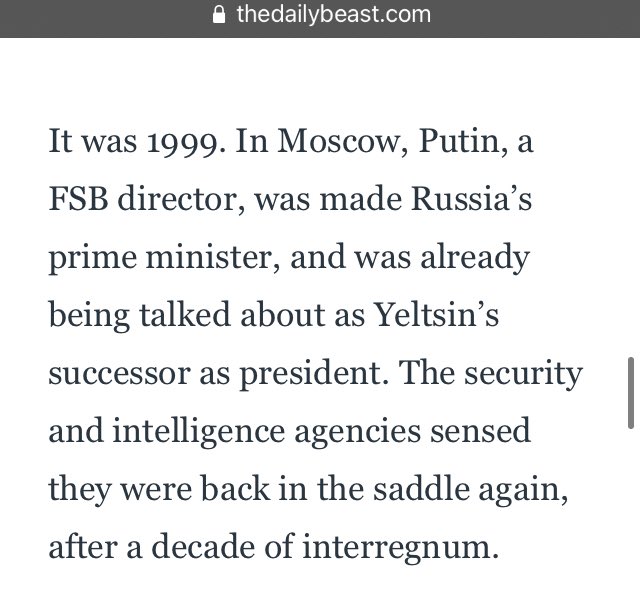
Meanwhile, 1,600 miles south of Moscow, in Tel Aviv, Israel, Kapitonov was just settling down in a new Middle Eastern country, his first foreign posting since the collapse of the Soviet Union. He planned to stay there for months or perhaps years. 
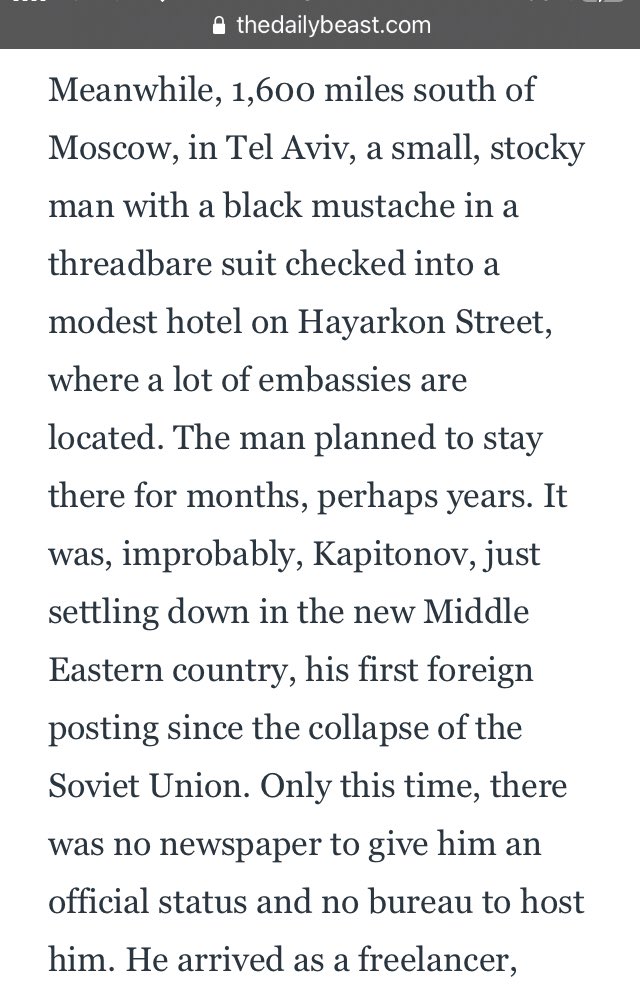
Only this time, there was no newspaper to give him an official status and no bureau to host him. He arrived as a freelancer, “kept a low profile and looked very insignificant,” as a former officer of Shabak, Israeli counterintelligence, told me. 

Under Putin, Russia was growing more assertive at the tail-end of the Yeltsin years, following liberalization, the rise of the oligarchs, and intermittent hiccups with the West, especially over the Balkan wars. 
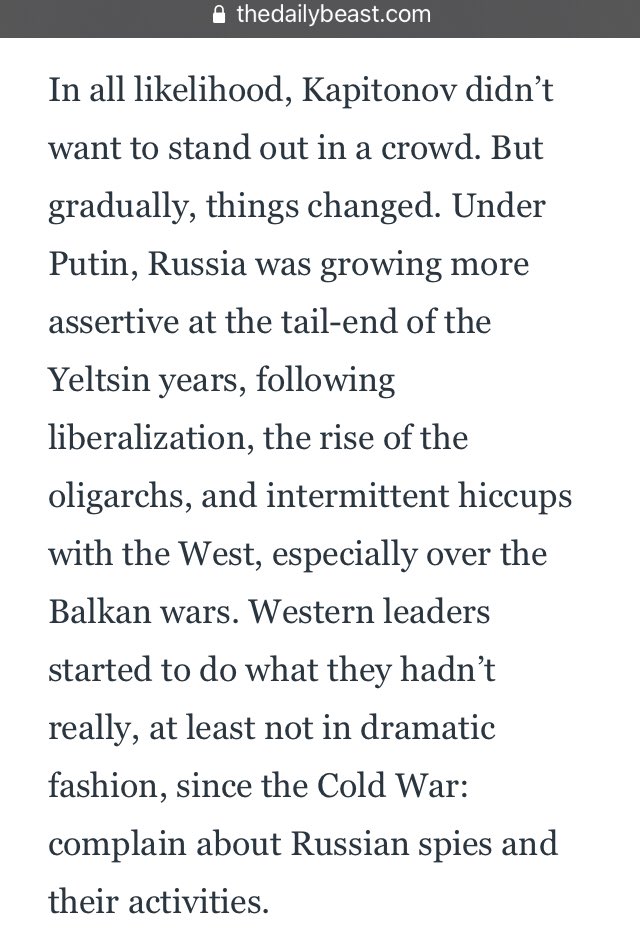
Western leaders started to do what they hadn’t done since the Cold War: complain about Russian spies and their activities. 
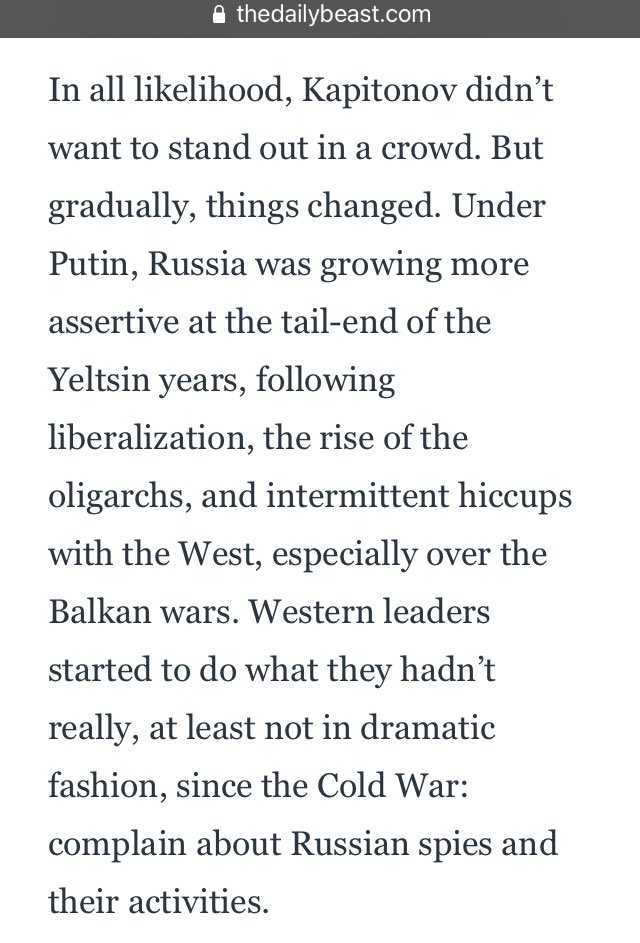
In Israel, Kapitonov was writing for several Russian newspapers & contributing to Russia’s TV channels. He managed to elevate his status; he was an accredited journalist and resided with his family in a comfortable apartment in the prestigious Tel Aviv neighborhood of Ramat Aviv. 
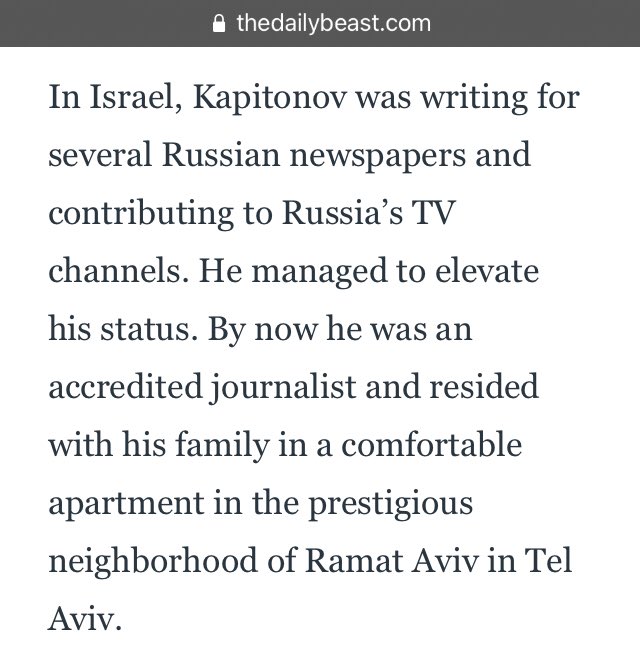
🤔🤔
Israel and Russia were getting closer politically. The Second Chechen War was talked about between the politicians of either country to prove that they were both fighting the common evil of international jihadism.
Israel and Russia were getting closer politically. The Second Chechen War was talked about between the politicians of either country to prove that they were both fighting the common evil of international jihadism.
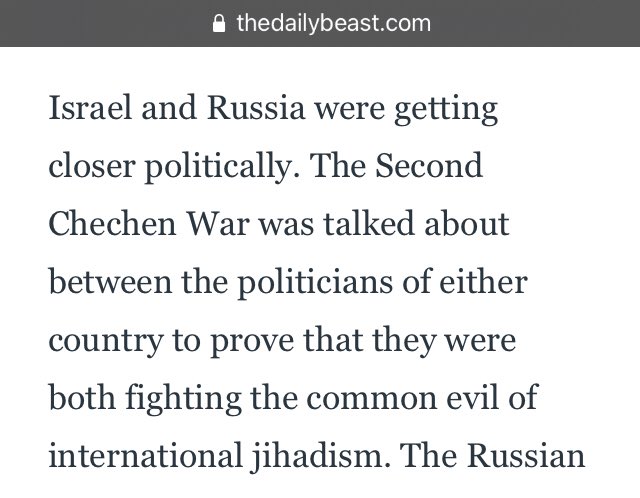
⬆️⬆️ @sisu_sanity @clearing_fog Golly, why does this sound a bit like an example of jihadism being leveraged as a mechanism through which to enable other objectives?? 🤷♂️
🚨🚨 The Russian embassy in Tel Aviv arranged screenings for Israeli journalists of state-produced documentaries depicting atrocities committed by Chechen separatists—documentaries manufactured, as we now know, by a secret section of the GRU known as Unit 54777. 
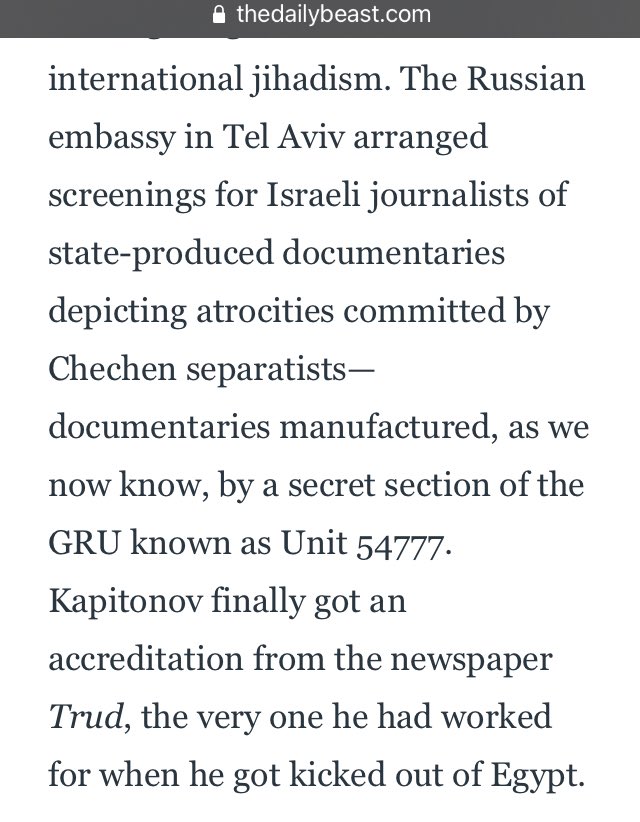
Kapitonov finally got an accreditation from the newspaper Trud, the very one he had worked for when he got kicked out of Egypt. 
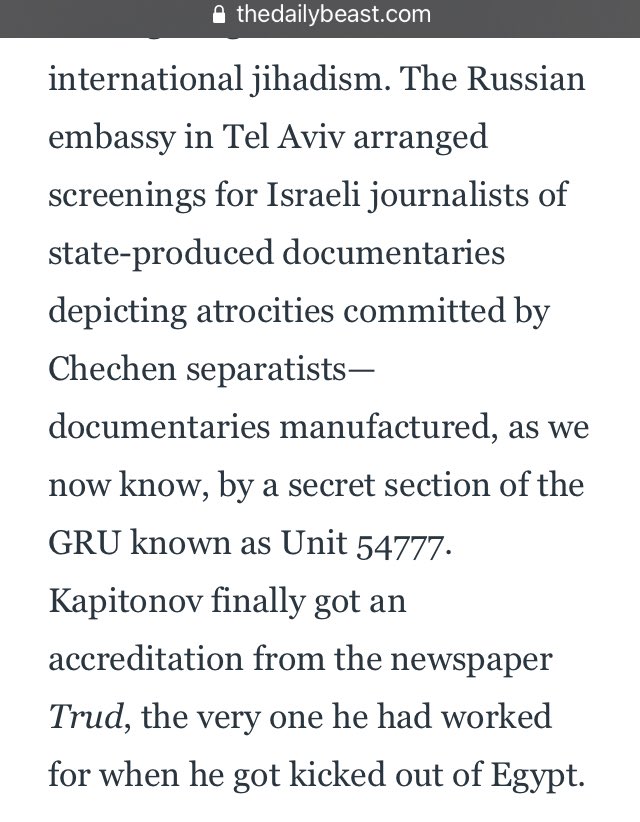
In early 2004, Israeli counterintelligence Shabak phoned Kapitonov & arranged a private meeting. They made it very clear that they wanted him to stop engaging in secret operations in Israel, whether intelligence collection or the production of active measures, they didn’t specify 
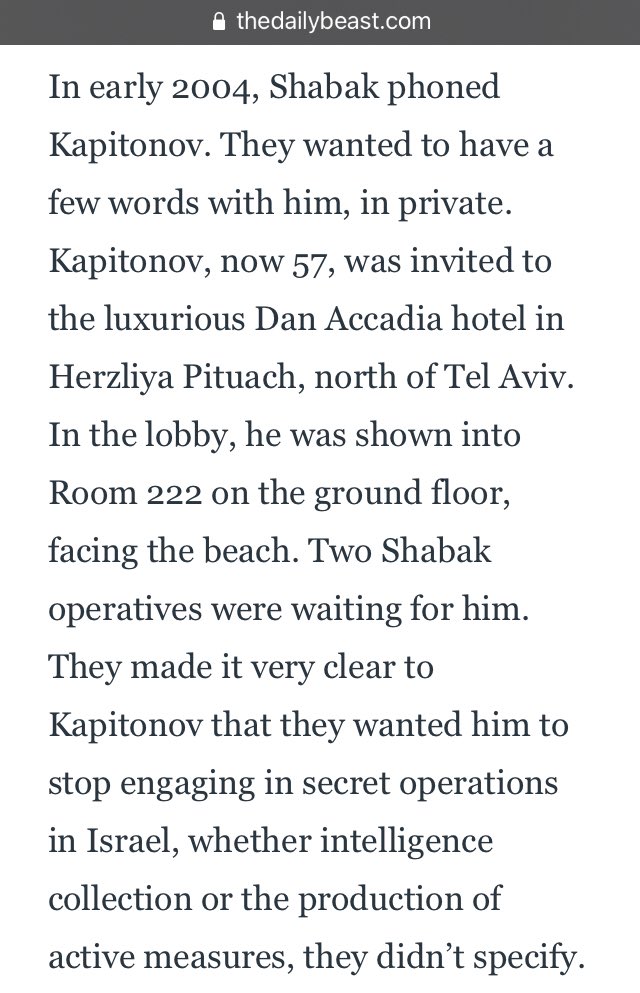
Over the next six months, Israeli counterintelligence put the squeeze on Kapitonov. Agents kept coming to his colleagues and his retinue asking questions about him. Many of those interrogated duly reported it back to Kapitonov. Whatever Shabak wanted to achieve, it failed. 
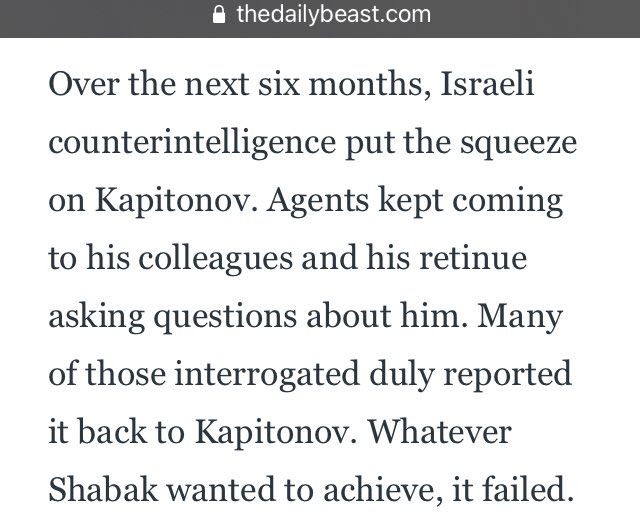
Kapitonov turned up the heat by publishing articles accusing the Israelis of mistreating ethnic Russians in the country. His stories were mixtures of real facts and wild accusations.
⬆️⬆️ Sounds familiar.
⬆️⬆️ Sounds familiar.
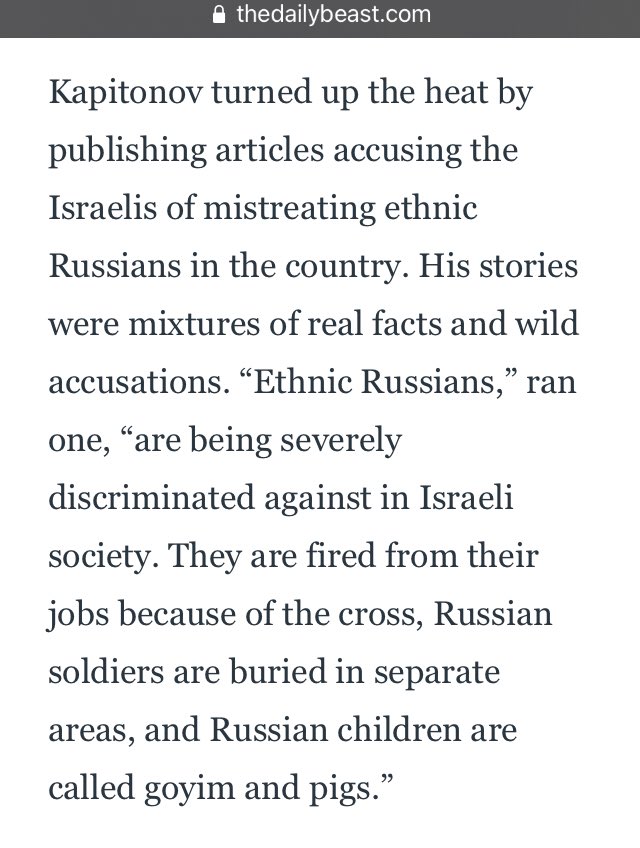
It was the moment when the Kremlin was taking serious interest in the Russian diaspora all over the world, including a very sizable community in Israel. 
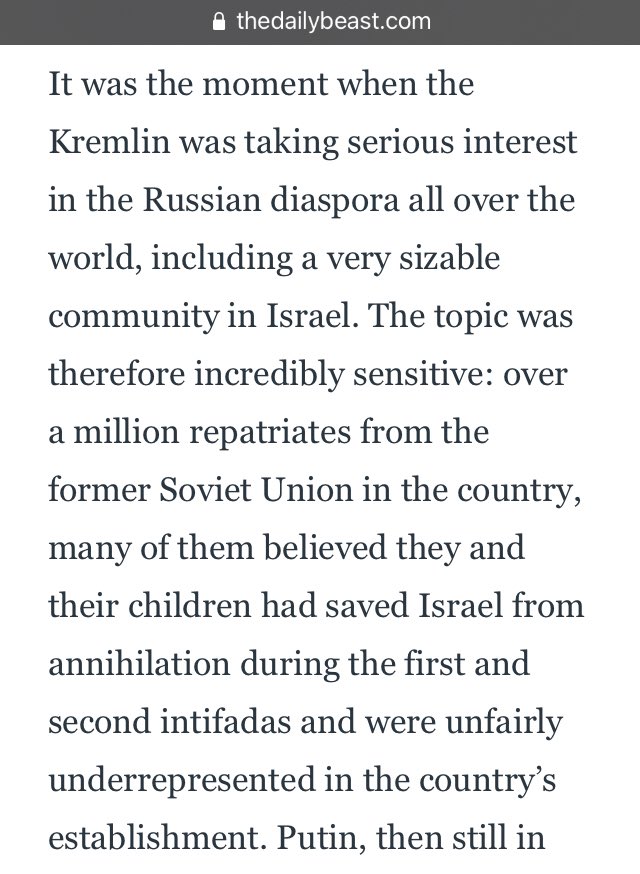
…over a million repatriates from the former Soviet Union in the country, many of them believed they and their children had saved Israel from annihilation during the first and second intifadas and were unfairly underrepresented in the country’s establishment 
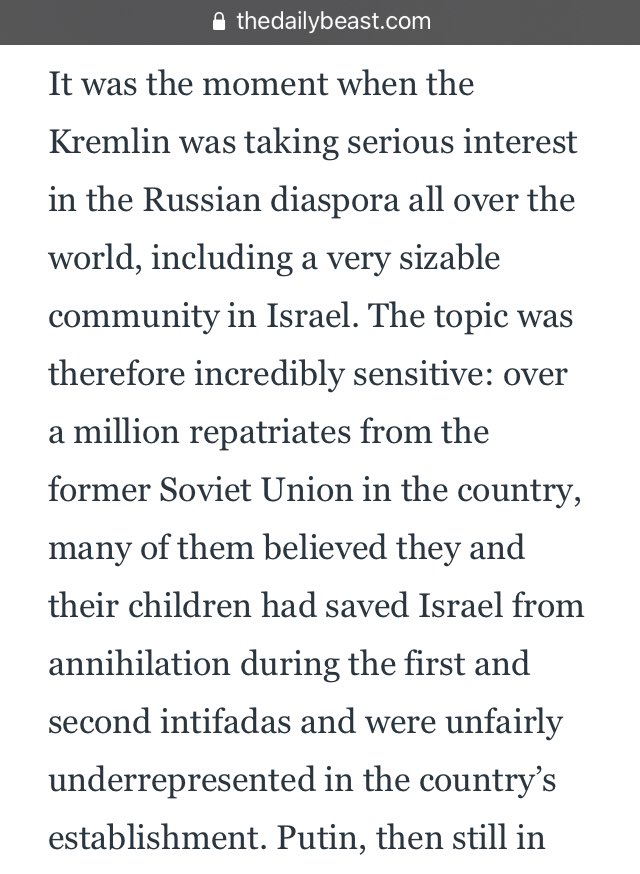
Putin, then still in his first presidential term, didn’t like that Israel had taken in Russian oligarch Leonid Nevzlin, on the run from Moscow, now residing in the Dan Accadia hotel in Herzliya where Kapitonov had his meeting with Shabak agents. 
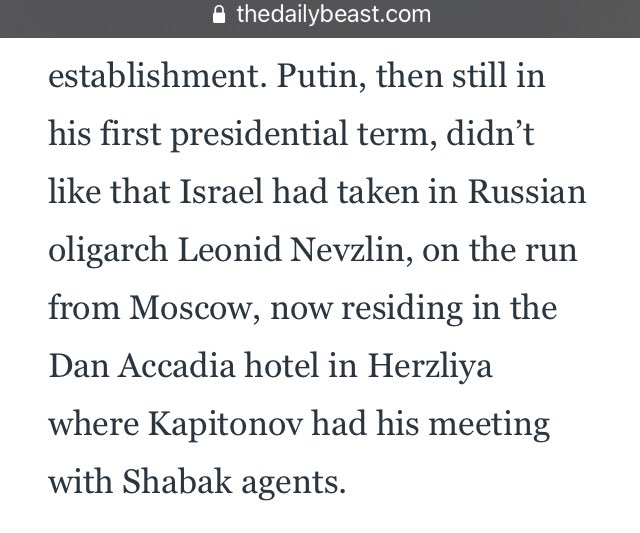
It accused Kapitonov of being “a representative of Russian intelligence who is in Israel under the cover of journalistic work, through which he establishes connections with Israeli citizens, and uses some of them [for] intelligence purposes,” 
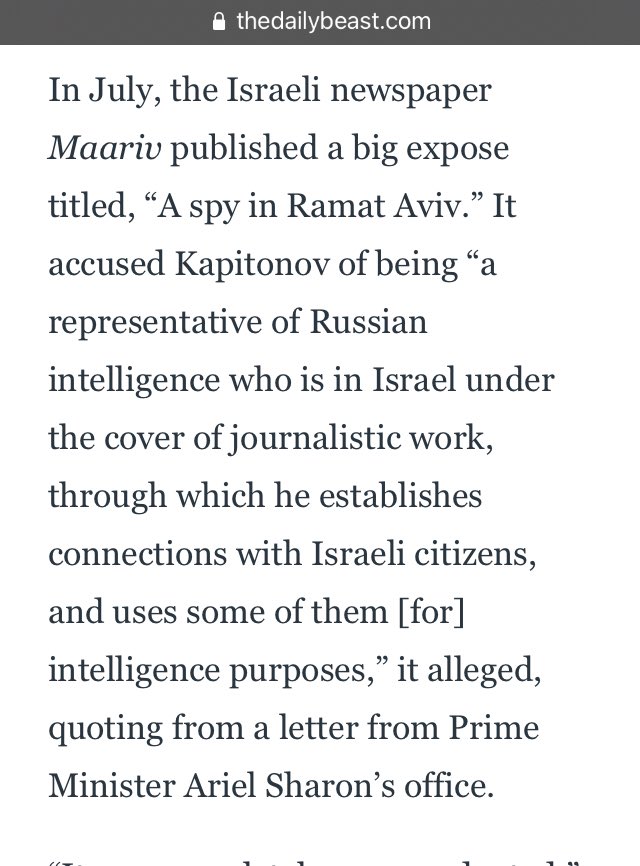
“It was completely unprecedented,” a former Shabak officer admitted to me. “Israel, as a rule, has been avoiding spy scandals with Russia by all means. The relationship with Moscow has always been too important.”
Nonetheless, Kapitonov was told to leave the country.
Nonetheless, Kapitonov was told to leave the country.
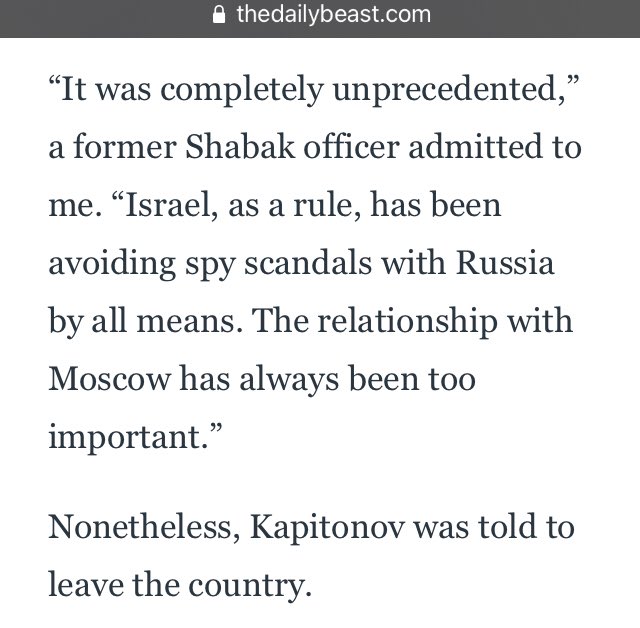
In the Moscow restaurant, Kapitonov kept entertaining me with his stories. He was talking mostly of hastily written books on hot topics and the “shitty” Ukrainian websites; in other words, of active measures and disinformation. 
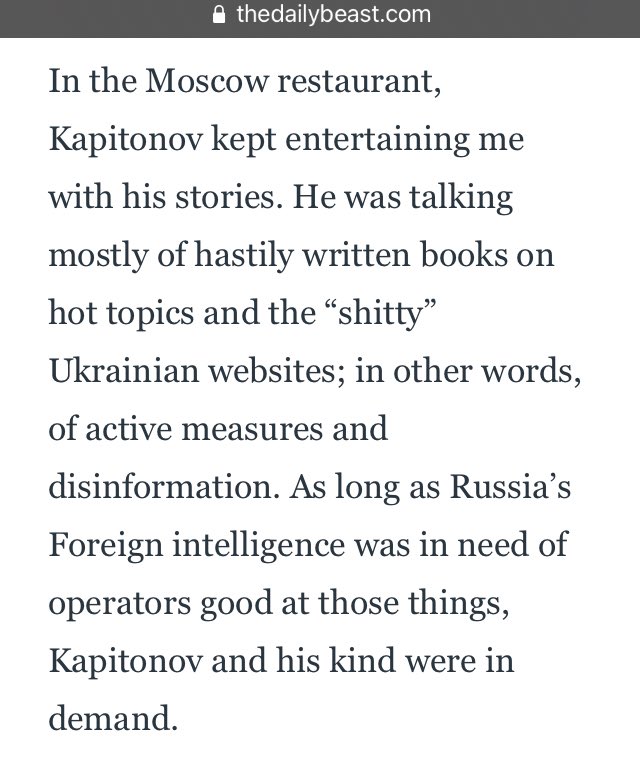
As long as Russia’s Foreign intelligence was in need of operators good at those things, Kapitonov and his kind were in demand. 
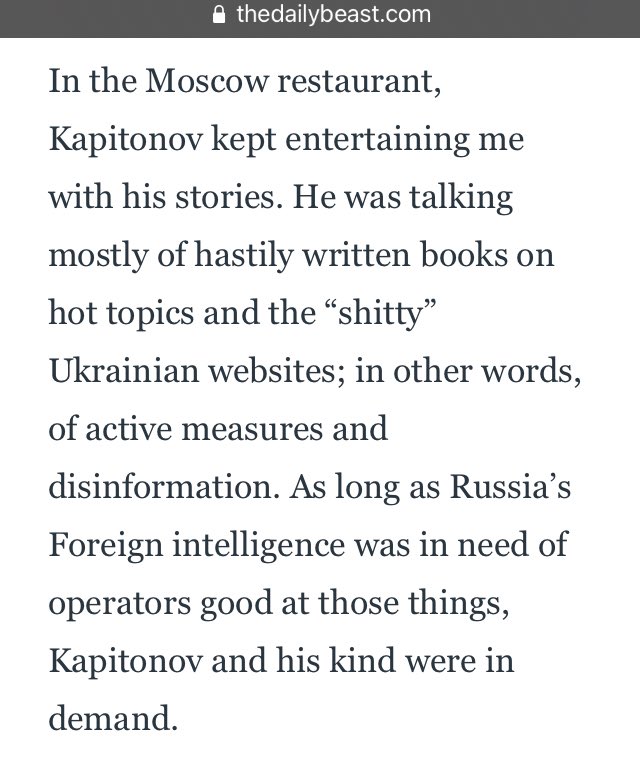
Sitting in that restaurant in Moscow in the late 2000s, a half-mile from the edifice of Putin’s Presidential Administration, I still couldn’t imagine just how valuable these graying manes of KGB disinformation and propaganda would be in the coming decade. 
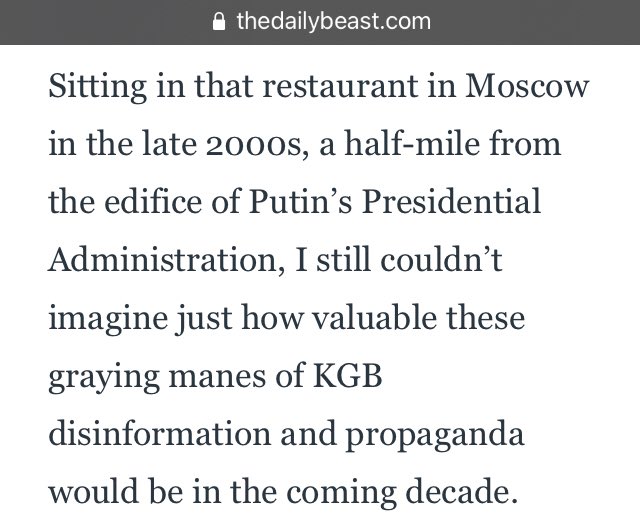
“Black stories” on Timoshenko would give way to a state apparatus dedicated to active measures, often accompanying covert or overt Russian military interventions in Ukraine, Syria, & sub-Saharan Africa, or cyberespionage & influence operations in the United States, U.K. & Europe. 
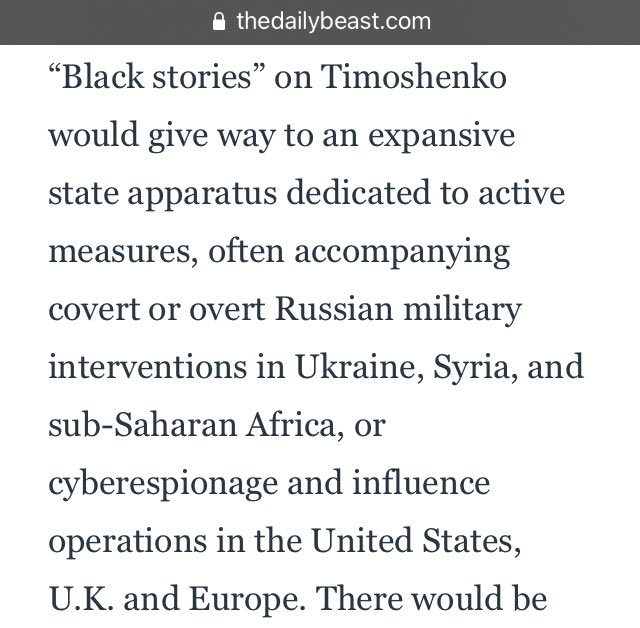
There would be more Kapitonovs, only now with greater latitude and resources, blending old forms of tradecraft with new forms of technology. They’d be adventurous, brazen and sloppy—unmasked, caught or expelled. They’d also get results. 

• • •
Missing some Tweet in this thread? You can try to
force a refresh

